#hap pops off about meta-narrative
Text
Okay, I’ve been quietly enjoying MHA as it finished up. The fixation has waned and I’m generally not obsessed enough anymore to put the effort into making more fanworks. But it seems like I have a few beehives left to kick before I move on. On this episode: I got set off by this industrial-level optimism and am going to rant about misleading story shortcuts.
(Spoilers for the end of the manga.)

There's a very common phenomenon that crops up in stories everywhere. A character goes though an experience obviously meant to Teach A Profound Lesson. The character gives a wrenching speech about how they're so changed now. And then... they go right back to doing the exact same shit they were doing before. The story writes "THEY'RE DIFFERENT NOW! DOESN'T THIS FEEL SATISFYING?" on the character's forehead in big block letters, but doesn't bother to follow through. It just hopes that people will do exactly what that post does: i.e. not think very hard and pretend it’s what actually happened.
MHA does this a lot. And Izuku and All Might are both poster children for this phenomenon.
The post I linked at the top is not an example of amazing character development. It is extremely awkward proof that neither of these main characters have meaningfully changed at all. I’m also going to go on a brief tangent and argue that their behavior has absolutely nothing to do with quirklessness because the narrative itself has not given a flying fuck about quirklessness since chapter 1.
Let's start with Izuku. At the beginning of the series, his greatest dream was to be a hero. But he did nothing to achieve it. He muttered and he scribbled in a few notebooks. No training, no real effort. And then he was ready to just give up completely after talking with All Might. All Might had to chase him down and dump a miracle intervention into his lap before he finally put forth any real effort.

And at the end of the series, once Izuku lost the last of his embers, he... apparently gave up again, became a schoolteacher, and spent his days spouting cope so lame that even other teachers didn’t believe it. It seems obvious he was not truly satisfied, but we weren’t told he did anything to change his fate. He just sat around complacently, for eight years, until All Might once again swooped down and shoved a second Deus ex Machina into his hands.
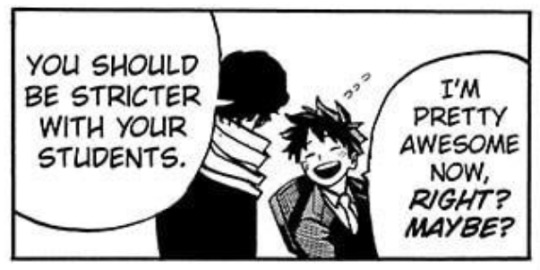
Oh, and did he have a whole arc about how he shouldn’t run off alone and try to do everything himself? He should rely on the help of his friends? That’s cute. Well, anyway, he’s going to run off alone for his final fight until his friends chase him down, again.
Contrast how Izuku learned to be not so reliant on All Might's guidance. That was very cool, and most importantly, it had consequences - it got him to learn kicky kick instead of punchy punch and triggered many of the events of the Dark Hero arc. But man, it was a pretty minor epiphany for a main character carrying an entire series on his back.
I like Izuku! He's a great character. I think it's cool and realistic that he defies the typical gung-ho overcome-every-obstacle Shonen stereotype. But it’s clear he didn’t change very much over the course of the series.
And All Might? Man.
All Might sees and learns a lot of things during the story. Many of his assumptions are, seemingly, challenged. But in his badass final fight, does he show any indication that he's learned anything new over the course of the series? Any proof that he's changed as a person? Anything at all? He runs off to fight alone, like he always has. He (apparently) doesn't even tell anyone he had the suit up his sleeve! So much for working together and sharing burdens with others. "I thought your quirks were cool so I copied them for my secret robot suit lol" hardly seems like a meaningful act of connecting with those around him. And has he learned anything from watching Izuku's heartbreaking unnecessary self-sacrifice? Not according to his suicide-bomb attempt. He’s only saved by the bad guy's overpowering urge to monologue.
"But but but he learned that you can still be a hero despite being quirkless!!!" Here's the problem: All Might never says Izuku can't be a hero without a quirk. Here's what he actually says:

What does he give Izuku at the beginning of the series? Power. What does he give Izuku at the end of the series? Power, after letting Izuku stew for eight whole years. (What a swell dude. What a dad!) It is the exact same scenario.
Yes, at the beginning, he used the shorthand of quirklessness = no power, and by the end, he's eager to hand out Iron Man suits. Believe me, I wish this change happened because he struggled with his deep-seated feelings of inferiority due to his latent quirklessness and finally learned that even the quirkless are inherently Worthy and Valid. But the way the story handled it, this "character development" boils down to "Oh, right, my buddy's kid can make rad support items!"
I've pointed out before that quirklessness showed up in chapter 1 as a cool story hook and then went out for cigarettes and never returned. We learn all about heteromorph discrimination but nothing about quirkless people, even in the movie about bad guys trying to eradicate all quirks! All the story's main conflicts are about strong vs. weak quirks, "good" vs. "bad" quirks... not quirks vs. non-quirks.
It doesn't matter to the characters either, to a truly bizarre degree. It gets dropped into Aoyama’s backstory to explain why AFO had power over him, but that’s about it. He even said it didn’t bother him as much as it bothered his obsessed-with-status parents. When Mirio is rendered quirkless... he might as well have torn his ACL. No existential grappling, no consoling speeches from Izuku or All Might, nothing besides Izuku briefly overthinking things and wanting to play quirk-hot-potato. And then Eri presses the undo button and nobody speaks about the issue again.
You'd think it would be a huge deal for born-quirkless Izuku and All Might. But they never talk about it. They never even think about it! They discuss it together for an entire two pages during the sports festival. It makes a surprise appearance in a single sentence in a single flashback of All Might's (which doesn't even make much sense... he says quirklessness means he "has no role"... after impressing Nana with the clear and detailed role he's invented for himself).
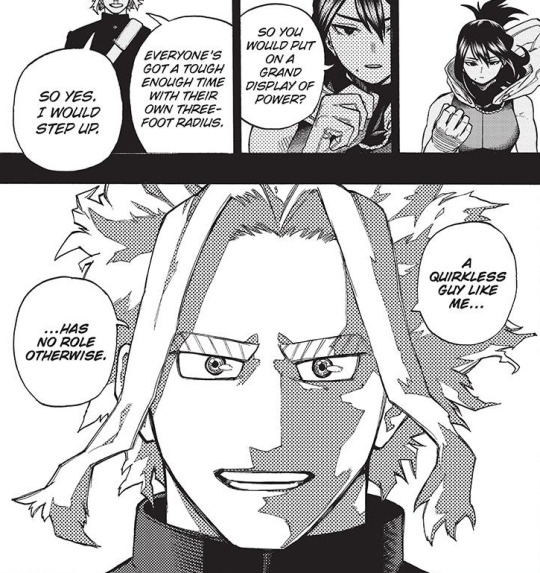
Its most important function is as a convoluted, unnecessary plot device explaining why Izuku and All Might were the most bestest OFA holders. Aside from the too-many-quirks-breaks-the-OFA-holder plot device, they could both have been born with unimpressive quirks and pretty much nothing would change about them, fundamentally, as people.
Even in the very last chapter, the part that's clearly reenacting the events of chapter 1... Izuku's mini-me symbolic stand-in is not a quirkless kid. He's just a kid with a weak quirk. You know, like 9/10 of Izuku's middle school class. The story doesn't even want to touch quirklessness in the callback to the scene where it mattered most! It treats it like an embarrassing promise it blurted out while blackout drunk that it wants to forget ever happened.

All Might still thinks of heroism in largely the same way. There are technically changes, but they’re all surface-level. He doesn’t go on about the ways you can be a hero by, say, using your huge influence and monetary resources for good. No, you’ve gotta have power. It could have been poignant that he expanded his definition of “power” from “quirk” to “cool technogadget,” but the story didn’t explore that. Izuku pays some lip service to the idea of alternate versions of heroism in the last chapter, but as soon as he gets the opportunity, he ditches his school job to go do real hero work.
If anything, All Might’s biggest character development comes from understanding that his legacy will live on. His dream won’t die with him. The many lights of his students now burn bright with his inspiration and will see his work continued.
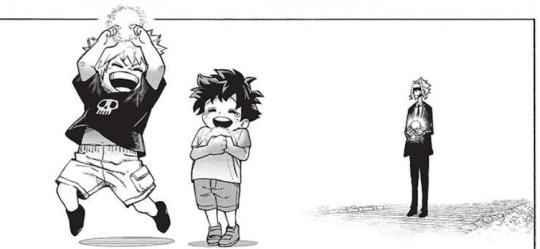
But this realization is not tied to his quirklessness, and does not really affect his definition of heroism. And once again... no concrete evidence of change. Partially because the ending rushes past like a runaway freight train, but still.
This issue isn’t exclusive to All Might and Izuku. I’ve seen a lot of criticism thrown at MHA as a whole because this pattern has repeated over and over and over everywhere. Lots of poignant speeches and gripping scenes, and then the world and the characters just traipse on as if nothing happened.
After a lifetime of watching cartoons... I find it hard to get upset when serialized comics do things like this. It’s a bit like getting upset at episodic cartoons for resetting to the status quo every episode, or dinging a children's show for oversimplifying good and evil (MHA fandom: take note of this, too). Sure, there are story formats, like novels, that ought to have a well-thought-out, meaningful progression from start to finish. But that is overwhelmingly not what you’re going to get with stuff like Shonen Jump stories, where authors have to sacrifice story integrity for a million different reasons, like merch tie-ins or fluctuating character popularity or trying to ensure a high view count so they don’t get dropped. (Hi, eighteen billion explosion cliffhangers! You’re still stupid!) It is really, really hard to make a coherent story under conditions like these. I want to believe that everyone is trying their best.
But I still think it’s very important to at least be aware when this attempted switcheroo is happening. We should not let ourselves get fooled when someone goes "Yep! Lesson learned!" We need to remember that actions speak louder than words.
It's almost inevitable that certain genres, like this one, are going to take these shortcuts. It's a bit pointless to spike one's blood pressure getting mad about it. But it's still always important to pay attention. And then go write nice fanfic where things have actually changed.
31 notes
·
View notes
Text

I was very surprised when I saw this in the subs for the most recent episode. As you might recall, the manga translates it differently, saying that Endeavor couldn't look back on the past:

I've noticed that the subs of this show tend to be more accurate than the manga, so this was a surprise. Which one is correct?
The answer is: Japanese is confusing! Keep reading for a badly-explained language crash course.
One of the things that makes this language hard to translate is that it is heavily context-dependent, and looking at single sentences in isolation are often not enough to understand the meaning. One reason why is because, in Japanese, you often do not spell out who the subject of a sentence is if it can be inferred from other things.
For example, just a few pages earlier, Katsuki says:

But if you look at the actual raws, you will not see "anata" or any direct reference to the word "you." He's more literally saying:

We infer the "you" because... who else would he be referring to? It makes sense that he's taking about Toshinori because he's conversing to Toshinori one-on-one. This happens all the time in Japanese - it's actually a dead giveaway that someone is new to Japanese if they insist on using "I" or "you" where they're technically not needed.
Now let's look at the raws.

Right at the very top, we see 私 (watashi), the word for "I," which, at first glance, might suggest he's talking about himself.
BUT, note how the English sentence actually uses "I" twice:
1) "I ended up like this"
2) "I couldn't look back on the past"
The "watashi" seen above is used in the "I ended up like this" part of the sentence. It's needed because he needs to clarify who ended up like this. However, the other part doesn't have a subject at all in Japanese. Literally, the sentence reads, "Couldn't look back on the past until I ended up like this."
Not very helpful on its own. So here's the fuller context of the conversation we're confused about:

In this case, Endeavor is the subject that directly precedes the sentence in question. Toshinori uses "watashi" to clarify "I ended up like this," (as opposed to anyone else), but otherwise keeps the subjects vague.
So... technically, it could be either of them. If you took the sentence on its own, without looking at anything around it, it would be fair to assume that he's talking about himself and showing a rare moment of opening up about his own feelings. But Japanese is all about context. I think it makes sense, both in the flow of conversation and considering his character, that he is talking about Endeavor. He mentioned that Endeavor changed, then talks about what allowed that change.
Hope that was educational, and that it helps you understand a little better why sometimes Japanese translations end up so wildly off the mark. It's a difficult language to turn into English!
#crawling from my hole now that more toshinori has appeared#bnha#toshinori yagi#mha season 6#hap pops off about meta-narrative
344 notes
·
View notes
Note
Hey!! This is the anon from a while back who had that convo with you about quirkless discrimination with your cannon vs fannon posts. The one who sent a way too long ask haha.
I still haven’t picked back up BNHA, just still dinking around in the earlier seasons with my writing after dropping it so long ago due to the exact reason you outlined; I stopped watching due to a certain character stagnating while saying they’re changing. Which I find amusing how prevalent that problem is in so many arcs that it’s the reason I stopped watching the show actual years ago (though not solely, it was that + a combination of other things with that arc but it really exasperated it) and you’re now talking about the same exact issue for the end of it. I don’t even feel like I can say it’s due to external pressures rather then just a weak point of the writer at this point tbh.
But, besides that, on the topic of why I initially started this ask, I just wanted to say it’s interesting to hear the story has still done squat with quirklessness, really goes to show the whole glaring divide in exactly what we where talking about so long ago. Full circle kinda?? It really is such a shame the show never went into it and kinda failed to scratch the surface of anything with how compelling it would have been and how easily it could have tied into the whole of the series’ themes.
But hey, like you said, there’s always fanfics. Just thought I’d send in an ask about it since it was fun talking to you about it last time.
Now that it’s over, I might give the show another shot, for old times sake, we’ll see!
Oh as an add on, as the fannon vs cannon anon, I do want to put a note that since I haven’t seen the thing myself I’m not making too strong opinions on it or agreeing with everything in that post, just contemplating the specific stuff I talked about in that previous anon ask as a sort of now outsider to the series.
This isn’t a “oh you’re wrong!” but making sure people know I’m not blindly following things I’ve read about a series rather then forming opinions around it from first hand cannon, HA! I’ll do that when I maybe start watching it again…one day…
-
(The post under discussion)
Hello again! Glad you're still enjoying the fandom space and haha, it's ironic that this issue is why you dropped the show. I'm also going to caveat that I'm not trying to dunk on Horikoshi or be a bitter hater. The issues I'm bringing up are par for the course for most serial writing, way harder to avoid than they seem. I really liked MHA overall and have huge respect for Horikoshi's writing, art, and ability to keep his sanity while bringing this behemoth to life.
Anyway, a response.
I mentioned a few aspects where quirklessness got brought in later in the story, but overall, yeah, it still felt kind of… vestigial. To me it felt like the author threw it out there at first thinking it was a cool idea, then later went "ugh, shit, that's not actually where I want to focus. I can't retcon it, so let's just... minimize it and move on." A lot of times when big series start, they toss out a whole bunch of possible story hooks and then narrow down to just a few that they're actually going to spend serious time on... anyone who gets hooked on a premise that doesn't end up being developed further can be left feeling disappointed.
I suspect this is exactly the reason why MHA has such a giant fandom. The show's clown-car cast means that pretty much no character really gets "deep" treatment. Instead we get 1,000 tantalizing flashes of really, really cool possibilities. We get sucked in by an awesome idea, get frustrated when the cool character/premise barely gets touched again after that, and then feverishly fill the empty space with fanfic and fanart. (I'm lucky that my favorites, Izuku and All Might, were about the most main of main characters, and even they felt somewhat shallow. I can't imagine the agony of being, say, a Momo fan.)
Unfortunately when a story does this, it also means that it's inevitably going to disappoint its fanbase. It tossed out 1,000 awesome ideas but it only has space to cultivate a small handful of those into proper plotlines… not only is it sad to see all the unused plot threads peter out, but usually the realized story ends up outright contradicting at least a few very popular fan theories and hopes. This doesn't mean the story's bad, far from it. But in these weekly-chapter stories where fans have years or decades to get attached to their interpretations and predictions, praying each week that yes, it seems like a long shot, but maybe the story will veer off into X… things quickly spiral into enormous bitterness when those decades of hope are finally snuffed out for good. (This same phenomenon makes me dread the eventual end of One Piece…)
MHA had a lot of people going "it's not like other shonen!" because it had lots of promising ideas. But it turned out that… yes, it is just another shonen. Shonen are tons of fun, and I love MHA overall. But man, it got hit hard by those high expectations.
I was a bit harsh (and incorrect) in my post, saying Izuku/All Might haven't changed at ALL, and that quirklessness meant NOTHING. It gets outright confusing when there are characterization backsies like the ones I described. Which is canon: the single panel where a character says "quirklessness is a big deal to me!" or the way that every other character behavior and plot point screams "sure doesn't seem like it"? They're both real. And this discrepancy depends on the reader's interpretation too: I'm extremely picky about characterization, while someone less anal might not see any contradiction at all. So we get All Might fans insisting that the show made quirkless issues into a huge enormous part of the plot/characters, and meanwhile I don't see it, and get annoyed and preachy because it feels like the narrative is being unfairly ascribed depth and profundity that I really wanted but never actually saw from it. How dare!
ANYWAY, I highly recommend checking out the rest of the show. I have a feeling the final arc is going to look amazing in animated form once it's finally done. The final section is a combo of delightfully over-the-top shonen insanity and surprisingly weighty outcomes. We can debate whether it really earned those outcomes, but I'm at least pleased that it tried.
9 notes
·
View notes
Text
Fanon vs. Canon #2: Quirkless people face heavy discrimination

The second of these posts , first post is here.
This fandom interpretation pops up more frequently with Izuku than it does with Toshinori, but I don’t care, I’m going to write about it anyway. This concept is exactly what it says on the tin: that the phenomenon of Quirklessness is a black mark on a person’s reputation. It ranges from “people make fun of them” to “Quirkless people are abandoned by their parents and randomly murdered on the street.” With Toshinori, it’s often used to formulate backstories about his childhood: he was abandoned as a child for being Quirkless, or had to struggle through heavy discrimination, making Nana’s decision to give him One For All even more meaningful. It’s also used in All-Might-critical works to make him give up on Izuku (so that Izuku can go become a cool vigilante or villain out of spite, or so that some other character can swoop in and play mentor).
You only have to watch the first episode to understand why this idea exists. Izuku’s Quirklessness is devastating to him. His mother cries and tells him “I’m sorry” over it. He is bullied and mocked and told that he can’t achieve his dreams. It’s easy to look at this and conclude that Quirklessness is a terrible, tragic curse.

But... let’s consider the circumstances first. Izuku’s life goal is to be a hero. And in this series, “hero” is a job position, one that specifically exists to allow people to use Quirks freely. Of course Quirklessness would be a catastrophic handicap in a Quirk-fueled profession.
Imagine a basketball anime where the protagonist is 4’2” but still dreams of joining the top ranked high school basketball team in the nation. Of course his height would be a horrible setback for him. But it would be a huge stretch to decide, just based on watching the basketball tryout episodes, that anyone in their society shorter than 5’11” probably ends up homeless or murdered in back alleys. Quirks may be vital for hero school... but that doesn’t mean they’re vital everywhere.
For example, in the anime, a lot of characters get little intro sequences that briefly showcase their name and their Quirk. At first, this seems to reinforce the idea that this world thinks Quirks are the most important thing about a person. But notice who gets these special intros. As far as I’ve noticed, only heroes or hero students get them. Other characters, even recurring ones like Tsukauchi the police detective, do not get this kind of attention. It’s only done for heroes and aspiring heroes because heroes are the only group that are defined by their Quirks.

So how does the rest of the world handle Quirklessness? First off, we learn right away that a full 20% of the population is Quirkless. That’s huge. That’s every one in five people! Even if it’s heavily skewed towards the older population, it’s still an enormous percentage. And in the past, the Quirkless population was even larger. This is not an uncommon phenomenon whatsoever. Every person in this society most likely knows a Quirkless person personally.
Of course, it’s very possible to discriminate against a large population. But does the worldbuilding seem to suggest this happens? It actually seems to suggest the opposite. One of the key conflicts in this story is that its society really doesn’t handle people with Quirks very well.
In the world of My Hero Academia, the government responded to the chaos of Quirks by banning public quirk usage entirely. This also extends to employment: people are not allowed to use their Quirks freely in the workplace unless they are "licensed" in an unspecified way. This puts a huge dent in the common idea that being Quirkless hurts a person’s job prospects: having a Quirk wouldn’t necessarily be useful unless it happened to exactly align to their work needs and they also happened to be "licensed" for it. Considering the wide variety of strange Quirks out there, having a Quirk could easily be a downside! Companies don’t have to worry (as much) about Quirkless people accidentally setting chairs on fire or being unable to fit through doors. Being Quirkless could actually be a benefit.
This extends to things like housing as well. Vigilantes is especially direct in addressing these sorts of inequalities, like it does in these panels from chapter 37:
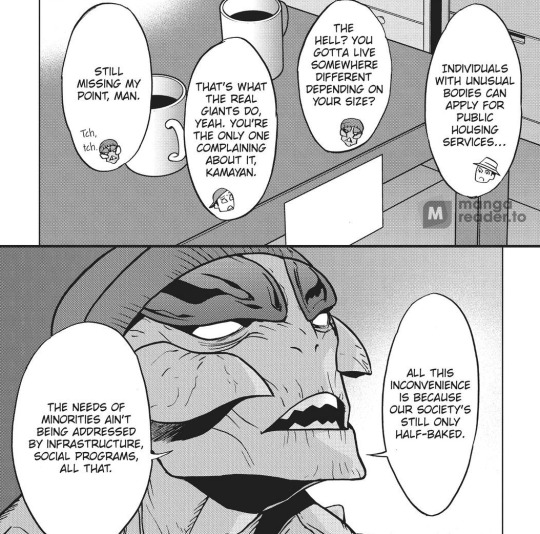
Quirks are only about 200 years old, and society still doesn’t seem to have the tools to handle them. It seems to have responded by trying to suppress Quirks as much as possible. If you can’t do so, then you are often forced to the fringes of society. This is the main conflict fueling many of the members of the League of Villains, and the entire Meta Liberation Army. In this society, the ability to act Quirk-free is the ideal.

The differences between people, and the conflict that differences cause, is brought up over and over in this series as it explores why certain people are ostracized by society and what happens when their suffering goes unaddressed. If Quirkless people really faced terrible discrimination, it would only make sense for the story to use them as prime examples of this! But it never does, not even in passing.
The most striking example of this occurs in the 3rd My Hero Academia movie, where a terrorist organization tries to use a bioweapon to eliminate all people with Quirks, leaving only the Quirkless. The story tells us several things indirectly. First: if Quirklessness were oppressed, it would make sense for this Quirkless-glorifying organization to use this angle in order to attract members: rise up against your oppressors! But Humarise doesn’t do this. It just uses a lackluster pseudo-religious argument that Quirks are a “disease.”
Second: if Quirkless people were really a despised underclass, don’t you think these threats would have caused a huge backlash towards the general Quirkless population? Izuku and Toshinori, being former Quirkless people, should have been aware and worried about this, if it were an issue. But we see no animosity like this whatsoever. Not the reaction you’d expect if there was some kind of sharp divide between Quirked and Quirkless people.
One last note on the worldbuilding: Quirklessness is naturally getting rarer and rarer every generation. It seems like a huge waste of effort to try and systematically oppress Quirkless people out of existence when they’re disappearing just fine on their own.
So, based on the way the story is set up, it seems unlikely that there are big systemic issues that cause Quirkless people to have a disadvantage in society. In fact, Quirkless people may have a leg up in some areas. But how about the way that individual Quirkless people are treated by others?
We’ve already seen that Izuku’s struggles in the beginning of the show are largely because he’s trying to get into a profession that is not made for him. Once he gets a Quirk, he has remarkably few lingering issues about his prior Quirklessness. The only time we see it affect him is during the Sports Festival, when he is discouraged by his failure to live up to All Might’s expectations and briefly wonders whether One For All would be better off with someone more skilled who can combine their existing Quirk with its power. But this is resolved within a single conversation, and to my knowledge, Izuku never shows this kind of self-doubt again. Edit: wait, yes he does - after the Shie Hassaikai arc, he gets down on himself and laments that Mirio should have gotten OFA instead. This triggers a bunch of other emotional issues, but they seem more related to hiding his troubles than to his sense of worthiness.
The most striking thing is how Katsuki, bully extraordinaire, reacts to Izuku over the series. He is enraged when the “Quirkless” Izuku begins showing off superpowers... but it’s all because it threatens his superiority complex. And later, in chapter 117, when he puts the pieces together that Izuku got a Quirk from All Might... it might just be my interpretation, but he doesn’t seem to react the way one would expect if Quirklessness was a huge mark of inferiority. He barely brings it up, and is mostly just self-centered and guilty about All Might’s downfall. The whole fight is him trying to understand why Izuku deserved this power, rather than trying to assert that he doesn’t deserve it in the first place.
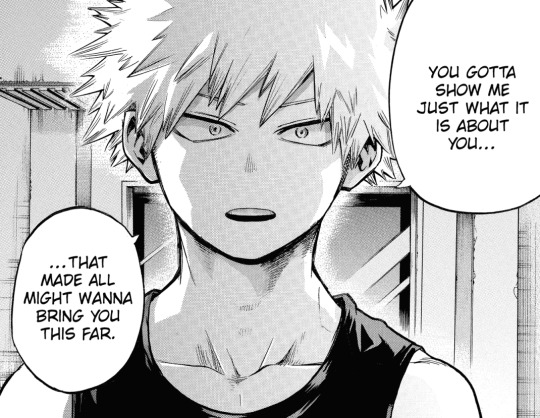
And after this fight, Katsuki seems to accept Izuku’s borrowed power as legitimate. He faithfully keeps Izuku’s secret and there’s no talk about anything like Izuku not deserving it.
Later, when (spoilers ahead for anime-only viewers) Quirklessness becomes a plot point in explaining why Izuku can wield One For All without shortening his lifespan, none of the vestiges express much wonder about Quirklessness itself; they don’t say anything like “to think that such a despised condition would have such a fortuitous upside...” It’s just treated as an interesting oddity.
There are three other confirmed born-Quirkless people in the main series so far: Toshinori Yagi, Melissa Shield, and Yuga Aoyama. With Toshinori, we don’t learn much about his experience being Quirkless, just that the world was in turmoil during his childhood and he felt compelled to make a difference. He doesn’t talk about what it felt like to be Quirkless, because trying to get personal feelings out of him is like pulling teeth.
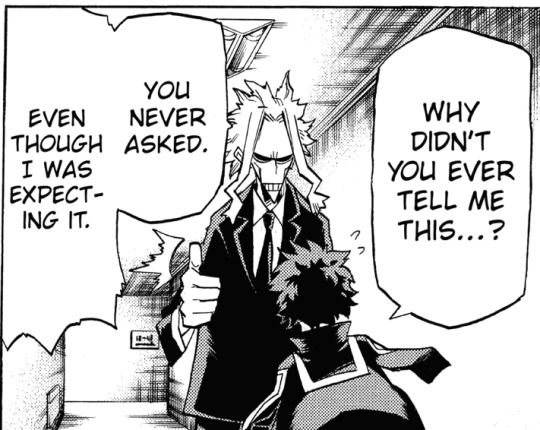
He does tell Izuku that Izuku can’t “become a hero like All Might” without a Quirk... because of course he can’t. All Might can’t be a hero like All Might without a Quirk; no support items could possibly bridge that gap. Otherwise, he doesn’t give any overtly negative opinions on Quirkless people throughout the course of the story and is overall pretty cryptic.
Melissa Shield, on the other hand, has a whole mini-comic all about her Quirklessness. Here’s how her peers behave towards her:
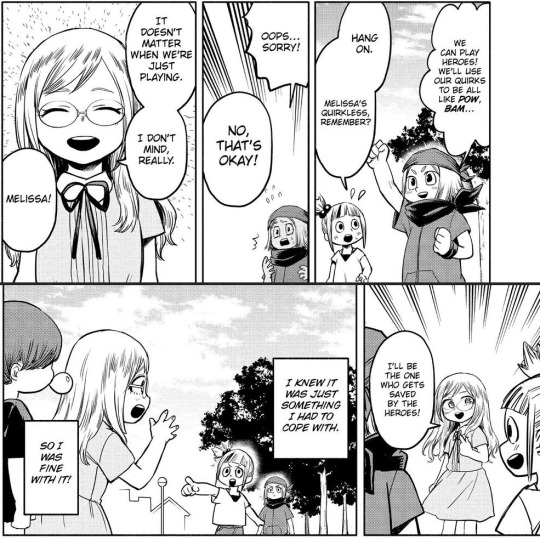
Far from the witch-burning hatred we see in fanfic. They’re friendly with her, they’re trying to include her. The main thing she struggles with is not overt prejudice, but a feeling of being different. (And again... she is probably not as alone as she feels. Remember that 20% number.)

But luckily, during the comic, All Might teaches her that you don’t need a Quirk to be someone’s hero, and her dejection lifts. By the time we see her grown-up in the movie, she seems happy and well-adjusted, and discloses her Quirklessness voluntarily without any apparent distress. She even seems confused when Izuku expresses pity towards her. She’s in a prestigious academy, studying to be a scientist, and there are no signs that her Quirklessness is hindering her goals.
Aoyama has a less clear picture of his childhood, but like Melissa, there were no indications of bullying or oppression, only a fear of being different. It wasn’t even him who felt this fear the strongest... it was his parents, who entered into a deal with the devil to grant him a Quirk so he could be more like everyone else. Did they do this because Quirkless people are shameful pariahs in this society and they wanted to protect him, or because they were vain and wanted to keep up with the Joneses by making sure their kid was as flashy as everyone else, even if it meant consorting with crime lords? Maybe it was a little of both. We may never know for sure.
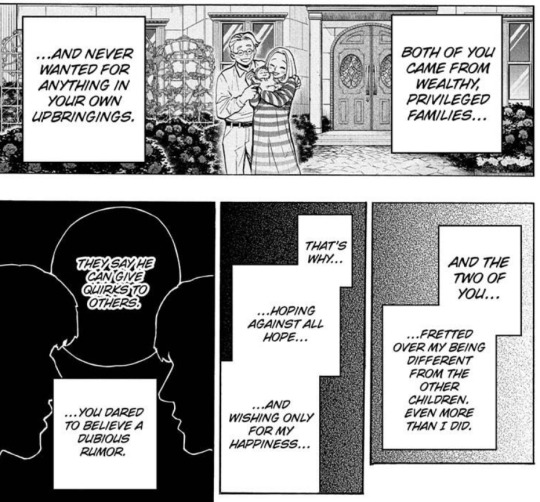
The takeaway from this is that none of these characters show evidence of widespread oppression because of their Quirklessness. Izuku is the closest thing to an exception - he was ostracized, and targeted by a bully, but his situation was complicated by his hero goals, and Katsuki seemed hellbent on putting Izuku down even before he knew Izuku was Quirkless. Quirkless people suffer from a fear of being different... but “being different” is not something unique to Quirkless people. People with inconvenient Quirks are shown to suffer much more because of their Quirks than we see any of the Quirkless characters suffer for being ordinary.
In conclusion: both from the worldbuilding and from individual histories, there’s not a lot of support for the idea that Quirkless people face marked societal difficulties, or are considered lower-class, except perhaps in the context of a hero school. They might feel left out and different, but that’s a far cry from being randomly targeted for hate crimes.
Even if there’s little canonical backing, it makes sense why Quirkless discrimination would still be an intriguing concept to explore. It’s always poignant to explore the story of someone who lacks the thing everyone else has. Plus, the distinct lack of canon coverage leaves plenty of opportunity for fandom to fill in the unexplored possibilities.
But according to the official story, the condition of Quirklessness seems about on par with being born short in a world where some kids want to grow up to be basketball stars. Can it cause discrimination? Yes, for sure. People will discriminate over the most trivial things, and many Quirks can provide intrinsic benefits that a Quirkless person will miss out on. But it seems like something subtle, not on the level of a widespread hate campaign.
Once again... I'm not some kind of expert, I forget basics about the show all the time. I'd love to hear your rebuttals or additions on the topic. And fanfic is valuable and fun because it explores topics in a different way than canon does.
(Thanks to @journalxxx for lots of help and input on this post)
#toshinori yagi#izuku midoriya#quirklessness#bnha#bnha spoilers#bnha manga spoilers#hap pops off about meta-narrative
478 notes
·
View notes
Text
Fanon vs. Canon #1: All Might is insecure about his appearance
Been doing some musing about fanon and canon in the MHA universe, and was convinced to put it online, so here you are.
A lot of people make fanworks because the source material feels incomplete in some way. They explore things that they feel could’ve been fleshed out more, or interesting alternate character interpretations, or AU scenarios. Sometimes, I spend so much time playing around in the fandom side that I forget what was actually in the show... I go back to rewatch and am shocked to realize that the character I got to know so well in fanfic is actually very different in the source material.
So, since I find it fun to think about this stuff, I figured I’d go through a few really popular fan assumptions about my current obsession, All Might, that actually seem to clash pretty hard with the source material. The first one I want to tackle: the well-worn idea that All Might is insecure about his appearance... that he never wants anyone to see his scar, that he thinks he's ugly and is constantly self-conscious about his failing body.
This interpretation is all over, and it’s not hard to understand why. I would be insecure too.
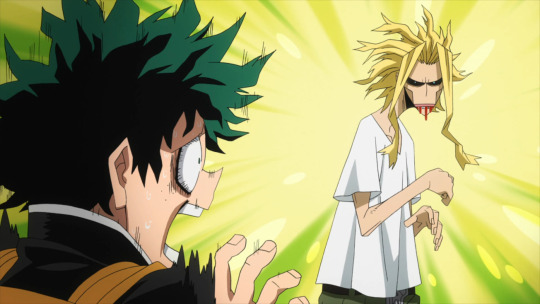
The whole show kicks off because of his injury and its effects. He spends most of the story trying to hide his frail body. His central conflict revolves around his failing strength and how that changes his abilities and identity. So it makes perfect logical sense that he would be horribly self-conscious about his sick and injured body when he spent so long building an image of perfection. It makes sense that he would hate his true form, that he’d be embarrassed by it, that he’d be ashamed.
And yet... that’s not how he seems to act in canon.
He definitely tries to hide his true form, because it would damage the perfect image he’s built around the Symbol of Peace. He jokingly calls himself “old man,” and he is very frustrated with his body’s physical limits. But there’s very little indication of shame or self-consciousness about his appearance. Overall, he acts incredibly nonchalant about how he looks. A few examples:
In the very first episode, he shows off his scar to a complete stranger. There were other ways to get his point across, but he went right for the grisly one.
He does not seem very concerned about covering up his scar in general. He keeps wearing shirts that ride up and show it... get an undershirt, you’re going to catch a cold!

In the first movie, he spends an entire scene cavorting around in his underwear in front of his boyfriend while getting a medical examination. Even after he’s presumably done with the exam, he still spends most of the scene wandering around half-naked instead of trying to find a towel or something. His body language does not seem hesitant or embarrassed at all.
In one of the light novels, it’s implied that he bathes in the communal bath at the same time as Cementoss. It seems like he’d try to bathe alone if he were self-conscious about people seeing his scar.
In a Team-Up Missions comic, he is asked to play a zombie in a class film, and seems to delight in it to the point that he creeps around the office trying to scare Aizawa with his stage makeup. (He fails.) This doesn’t seem like something he’d do if he were actually sensitive about his appearance... it takes self-confidence to poke fun at yourself this way.
This part during the Stain confrontation in chapter 326 is the only example I could find of him saying something that could be interpreted as ragging on his own appearance, and that’s during a time when he’s consumed with self-loathing in general. In Japanese, it seems much less sarcastic and more matter-of-fact ("You wouldn't recognize me in this form.")
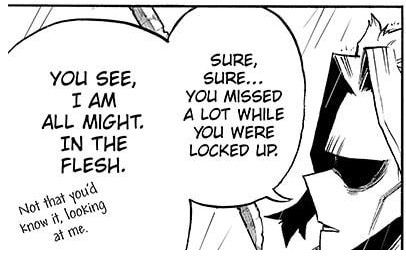
Aside from that, his overall demeanor and body language throughout the series just... does not come off to me as the behavior of someone who’s bashful about his looks. Yes, he spent a lot of time trying to keep his true form a secret. But it was always framed in a practical way. To me, it came across like someone covering up a tattoo when they go to work because they know their boss will throw a fit. They aren’t ashamed of themselves, but they know that being totally open will damage their reputation, thanks to societal pickiness.
Just... his entire attitude seems to be missing the tells one would expect from someone insecure. He’s polite and deferential around other adults, but of course he tries to be humble when he’s the biggest deal in any given room. One would think that if he were self-conscious, he wouldn’t unapologetically run around in eye-searing banana-colored pinstripe, or garish ties (which the anime needs to quit editing out). He’s constantly flinging out dramatic, over-the-top poses that look absurd in his true form, but he doesn’t seem to care. We never saw him being flustered when first integrating with the other U.A. faculty, or trying to explain himself after Kamino. He just owned it.

To me, it makes sense that he wouldn’t be a self-conscious person in general. He’s a wildly famous public media figure who seems perfectly comfortable showing off his butt in promotional material; you don’t get that popular without learning to tune out people’s opinions. And as Stain said in chapter 326, his real influence doesn't come from powers or quirks: it comes from his pure, driven force of will. He never needed any justification beyond “run ahead at full speed.” He never cared what other people thought; he actively left them behind to achieve his goals. Living that kind of life requires astonishing conviction and inner strength, and it’s poignant to see that inner strength demonstrated with a casual indifference about his true form even when most people would be insecure. It goes to show: even without his powers, he is anything but ordinary.
Another thing that could explain his ease with his true form is chapter 92 of the Vigilantes spinoff. Here, it’s shown (along with... several dubious things like “Might Ears”) that he’s always had a “true form,” even before his injury. It would be much less jarring to cope with a less-impressive alternate self if he always had a less-impressive alternate self.
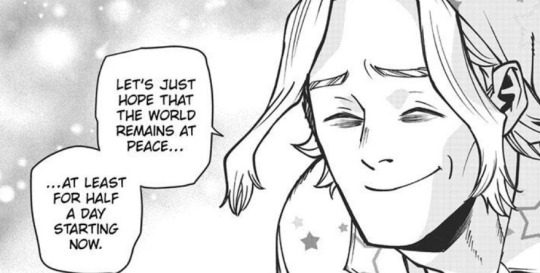
Of course, his confident act could be just that: an act. He could be secretly dying on the inside. People can keep their discomfort and low self-esteem to themselves, especially people like him who are concerned with projecting an inspiring image. But we never see him touch on the topic in his inner monologues, so there’s no way to know for sure.
(One caveat: a lot of fanworks that have him act insecure about his body are romance stories. In that context, self-consciousness makes a lot more sense. Of course a person’s appearance will be more high-stakes in a relationship based on physical attraction. He could very well be more shy than we normally see him if he were in a situation like that. It’s interesting to explore!)
But to me, the single most surprising part about this topic isn’t his own canon behavior... it’s everyone else’s. Nobody seems to bat an eye at his shocking secret. To the point that it feels bizarre. It’s mind-boggling how little anyone else brings up his looks:
Izuku does freak out when first seeing him... but after the initial shock, he never brings up All Might’s appearance again.
When Tsukauchi learns his identity in Vigilantes chapter 6+ Beta, he just starts harping about All Might’s paperwork. Nothing about how the #1 hero has suddenly deflated into a bag of bones.
None of the U.A. teachers comment on his appearance or seem to try and coddle him, besides showing concern for his time limit.
None of the students react to his true form, either, once they learn about it. There’s a bit in the Training of the Dead OVA where he’s assumed to be a zombie, but it’s brief and played for laughs.
In the Kamino fight, AFO goes on and on about how devastating it will be now that everyone has seen his true form... but the only person we see give any negative reaction at all is Endeavor. The public goes on cheering for him, the heroes keep fighting alongside him. Afterwards, the main fallout seems to be, once again, the issue of him being unable to fight. Nobody seems upset that he was deceiving them.
After Kamino, we get an entire episode about a newspaper reporter stalking the class and All Might, and yet all we hear is admiration of him. The reporter decides not to reveal any juicy gossip on him, and the newspaper is instead delighted to run some pictures of all Might eating meat buns in his true form.
There also seems to be very little media sensationalism after Kamino. There is a little section in red at the bottom-left of this newspaper that starts off asking “What is this zombie!?” but the main focus of the page is his hero form, and the end of the blurb concludes that it’s heartbreaking to see the comparison between his hero form and what he looks like now. Not exactly bloodthirsty journalism. (One note: apparently, in Japan, you can be sued for defamation even if the claims are true. So perhaps this is part of why the news acted so tame.)
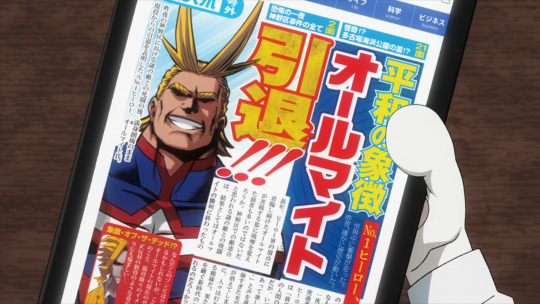
This is the only thing I could find where a member of the public actually said something mean about his appearance, and it seems like she blurts it out before she realizes who he is:

Also, look how he responds: pretty much exactly the same way he responded on the beach way back at the beginning of the story, when someone recognized him and he didn’t want to draw attention to himself and Izuku spending undue time together. More about wanting to avoid publicity than any kind of self-conscious or offended reaction.

Even the villains seem to go easy on him! (Aside from AFO, but he’s AFO.) The only non-AFO villains I can recall who specifically mock his appearance are two henchmen in chapter 313, who act smug and haughty for exactly 1 panel before cowering in terror once he starts yelling at them. Seriously, am I missing something? If anyone has other examples, please chime in.
My best guess, besides “the author didn’t want to deal with this rabbit hole,” is that it’s a narrative decision done to reinforce just how much influence he has. He’s so universally loved that even his ghastly appearance doesn’t dent people’s admiration. They still respect him no matter what he looks like. (But then they go and put “I am not here” signs on his statue... hmm.)
Anyway, the point of this whole post is: in canon, his physical appearance is overwhelmingly a non-issue. He doesn’t fret about it, and neither does anyone else. And, ironically, this goes a long way towards explaining why he’s characterized as the complete opposite in so many fanworks. Fan creations are often made to fill in things that feel like frustrating missing gaps in the source material, and it is extremely weird how utterly this whole issue is glossed over. It feels like a huge letdown, considering we spent the whole beginning of the series biting our nails wondering what kind of horrible consequences he might face after being found out. It makes sense why fans would want to explore a more plausible-feeling world in which there are consequences for not looking like a physical ideal, where the media is cruel and people are judgmental, where wounds can injure your heart and not just your body.
But it can also be valuable to look at why canon approached things this way. To me, it’s an inspiring thing, to think that he can exist unapologetically, not caring about what he looks like, just caring about what he can do to serve those around him. That, to me, is exactly what All Might is all about.
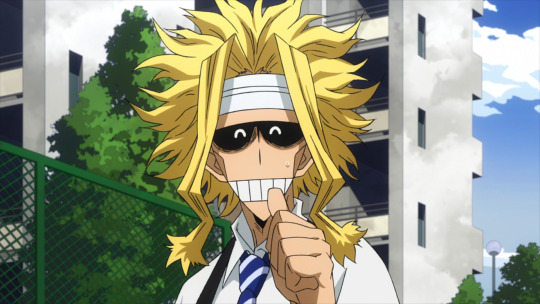
I'm always forgetting the things that happen in this show, so if you have counterpoints, I'd love to hear them. These are just my thoughts, I'm no authority. We're all here to have fun and be creative!
(Thanks to @journalxxx for lots of help and input on this post)
264 notes
·
View notes
Text
Some observations on this post discussing Izuku and All Might's relationship:
A notable thing about the scene where All Might and Izuku talk about Nighteye’s prophecy: when All Might says that Izuku inspired him to live, there are a series of flashbacks. And... for the most part, they’re not about times they had any emotionally close moments. We don’t see the heart-to-heart after Izuku cleans the beach, or All Might thanking Izuku for saving him at USJ. The anime shows a shot of the beach hug after Kamino, but the manga does not. Instead, the focus is on Izuku’s hero journey. They show times when Izuku pushed himself to his limits and refused to give up.
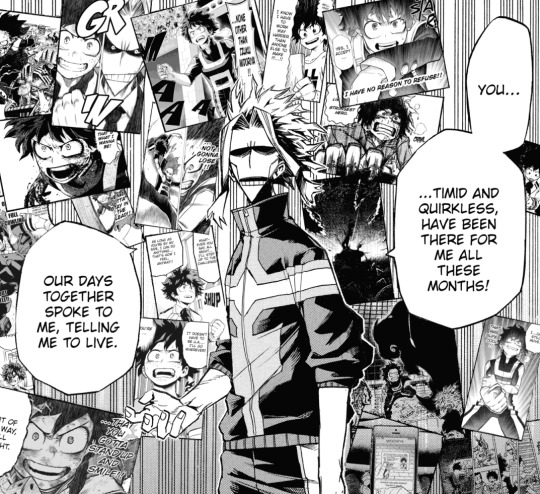
Izuku inspired him the same way he did at the beginning of the story. Even after so much time has passed and so much has changed, they still influence each other the same way: through their shared heroic goals.
Another thing that has always struck me is that, although Izuku’s example helped All Might find the strength to live in this specific instance... for the most part, Izuku’s inspiration has not been a good thing for All Might. In fact, that’s one of the things that fascinates me about their relationship: they are so good for each other, and yet so incredibly bad for each other at the exact same time. They relentlessly amplify each other’s worst traits, and end up becoming obstacles to each other that need to be overcome as part of their respective character arcs.
With Izuku, this is blatant: he’s held back by his tendency to imitate All Might. The story spells this out when he trains with Gran Torino and when he develops Shoot Style. In addition, All Might praises Izuku’s thoughtless, self-destructive tendencies over and over, “inspiring” Izuku to recklessly endanger himself to the point of permanent physical injury. This all comes to a head in the Villain Hunt arc, when Izuku decides to emulate All Might’s lone wolf tendencies too, and drives himself to the brink. Bakugo explains their dysfunctional dynamics really well in chapter 319.
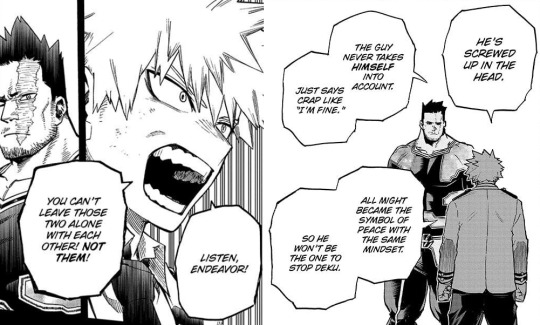
I think All Might’s internal dialogue in chapter 317 is the closest we’ve ever gotten to a "parental" mindset: he’s worried about Izuku more than he's worried about Izuku's heroic duty. But, it never properly manifests. As Bakugo predicts, even though All Might starts to realize the harm in the path he’s sent Izuku down, he is not the one to correct it and help guide Izuku to a healthier place: instead, class 1-A comes to the rescue. And later, as Journal's post points out, he gives exactly zero useful feedback when the two of them reunite.
Anyway, my point was that All Might also suffers from their interactions. Think about where he is at the start of the story: He’s injured, he will need to retire soon, he is clearly struggling with his new limits and having trouble finding a healthy balance. But now, enter this kid. Izuku’s “inspiration” embodies everything All Might should be avoiding: reckless abandon, pushing past limits, self-injury and self-sacrifice. And every time All Might draws on this “inspiration,” it’s to do something that further harms his health and damages his time limit, instead of trying to find some other solution, perhaps one that involves collaborating with others and sharing his burden. In fact, he became discouraged from changing his ways, because he needed to be a “good” example for his successor. He had to put on a strong front more than ever, even as it destroyed him.
Yes, Izuku motivated him to keep going and survive his fight with AFO. But how much of that fight happened the way it did because All Might insisted on modeling his hero persona far beyond when he should have, steadily weakening himself, insisting on fighting AFO alone instead of admitting to the other heroes that he was running on less than an hour of time and he might not be able to save the day without help? That “inspiration” saved him, but I’d argue that it was a large part of the reason why he got into such a horrible situation in the first place.
And again, Izuku wasn’t the one to help All Might overcome this problem. Instead, it was Aizawa, impressing on All Might the need to keep on living.
Although Izuku and All Might's relationship has changed over the series, I'd argue that this happened despite their interactions, not because of them. They tend to keep each other locked into rigid, role-based dynamics, and aside from their initial meeting and the granting of OFA, it’s by and large the other characters in the series who have helped them grow and change. Fingers crossed that All Might’s revelation in chapter 317 bears fruit in some way... but so far, that hasn’t happened yet.
#izuku midoriya#toshinori yagi#bnha#bnha spoilers#bnha manga spoilers#a long writeup about how these two are terrible for each other#hap pops off about meta-narrative
268 notes
·
View notes
Note
TLDR: There's some hints within the beginning of cannon that makes it feel like quirklessness was handled differently than later. I think compairing the first episode of BNHA to a sports anime introduction where the MC is short downplays what happened. Cannon feels inconsistent within itself with some topics, quirklessness feeling like a topic that keeps getting surface level touched and then dropped on its head for no reason. BNHA writing just feels weird sometimes. 20 percent of the world's population does not equal 20 percent of Japan's population. Society discriminating against some quirks or lack of ability to accommodate them does not point away from potential quirkless discrimination.
With your "fanon vs canon" with quirkless discrimination, I have some additional topics to bring up.
Heavy disclaimer I stopped watching the anime at some point (they could cover some things within the anime I have not seen but I did stop within the last season so not too bad) and I don't keep up with other BNHA media (I have not read the other manga or seen the movies). I also haven't watched this show in a while but I did try to go back and rewatch stuff that was relevant/read information on it. I almost didn't post this whole thing because I'm not caught up on everything, and don't really plan to be, but I typed it all up so I figure might as well, just feel free to point anything out where I might be missing knowledge from that's relevant or just haven't seen it.
First, just going to say I honestly don't think being quirkless is that big of a deal when it comes to heroics, I don't think it'd be that big of a "handicap". Second:
"Midoriya? You're kidding, right? There's no way you're getting into the hero course without a quirk!"
And Midoriya responds back with, "Well, actually they got rid of that rule."
This implies that schools could directly reject someone into job positions/schools based on their quirkless status. Its not just discouraged but there was a rule outright banning quirkless individuals.
The sub is more ambiguous, saying, "There's no way you can get into U.A. just by studying!" To which the response by Midoroya is the same. I could see some people still reaching the same conclusion that's more clear in the dub while others over look it.
Funimation dub and Crunchyroll sub as those where readily available to me. I most likely watched first in sub but I know I watched the dub of the first episode at some point a while after and have been using english transcripts that seem to use the english dub instead of the english subs to go back over facts of the series. I think I still reached the same conclusion that quirkless people seem to have lackluster protection laws due to that single line the first time I watched in the sub given the, "They got rid of that rule!" feels like it points explicitly towards Midoriya's quirklessness still.
I was always under the impression from watching that very first episode, that schools could just straight up reject quirkless people due to their quirklessness which sets a far more grim view of the laws and protections around quirkless people in universe. It was unclear if it was because of demands made by quirkless groups or of U.A.'s own accord that the rule was lifted, meaning other schools and areas could very well do the same if so.
I do think the first episode introduction to how Izuku is treated is way more harsh then most if not all sports anime drama. Take another anime I've seen, Haikyuu, with pretty much the exact same proposed plot but its volleyball and all he gets is silly comments or people going "You're a middle blocker?" or some disbelief. I'm sure its the same for other shows with that same plot; the main character is not going to have explosions used on him, physically beat up, his stuff thrown out of windows, completely isolated, and more through out his entire life just because they're short and want to go into a height focused game. I think it's a bit of a stretch personally to compile the two together and just does the opposite of what the fanon does sometimes - plays down the first introduction of the behavior Izuku faces instead of upscaling it.
Also, it's twenty percent of the world's population as far as I can find, not Japan's. I figure there's higher concentrations of quirkless people in different areas (as is such with real life traits) and that Japan's population is quite low (for 1 in 5 people with quirklessness being a major identifier for the main character, we only get two more that are born quirkless). Twenty percent of the global population doesn't exactly mean twenty percent where Izuku is. As far as we can tell, it really doesn't seem that way in canon, that everyone knows a quirkless person personally like the statistics would suggest.
To also address the thing about how society handles quirks: it just comes down to what society views as the 'average person' I'd think within the BNHA world. People who do not fit this will garner unjust attention, be it from "inconvenient" quirks (the shown gigantism quirks about housing in the example), "villainous" quirks (Shinsou), or quirklessness. While most quirkless people may not need extra accommodations (as societies are always slow on those, as shown in the manga) they are still viewed as...let's say "non-default". Society will always expect you to be this "default" that they find normal. While yes, some people may discriminated towards for their quirks, I feel this doesn't make much of a point towards if quirkless people are also discriminated against or not and I am unsure where comparing the two groups comes in. Having some illogical superpower is expected and people specifically dislike when someone's is inconvenient or has negative connotations to them - these are two points that can very well exist side by side. Society within BNHA just seems like (from my view on the cannon, as an anime only watcher up to a point) you must be the right type of quirked to be accepted full heartedly, but you must still be quirked. It's also shown that the quirk license requirement really isn't taken all that seriously within the show (Bakugou uses his multiple times and so do some of his middle school "pals", Izuku's classmates in middle school in general, kid's in kindergarden aren't chastised for playing with their quirks when they first come in, Inko can be seen using her's, and I'm sure there's more examples not coming to mind) - it seems people only stop turning a "blind eye" if you are abusing the power, being a vigilante with it, or are using it extremely disruptively within the anime. Small, daily use seems to be acceptable as far as we can see from the anime canon. Which isn't to say there's still some stuff you could go in on for this law, it is a potential debate about in the BNHA universe but overall I don't get the impression from the anime that its some huge deal if you use your quirk without a license unless its the previously mentioned factors.
To move onto the one organization in the 3rd BNHA movie, as stated before, I haven't watched the movies but honestly it isn't the first time some villain's reasoning has been a bit...oddly chosen? In BNHA, especially in accordance to quirklessness. There was also another plot point about making people quirkless (though also to sell the ""cure"" to said thing to the hero side) but it was...about bringing back the Yakuza? Kinda also felt like a loss in opportunity to me. With the other signs in the anime at the beginning, it feels less like quirklessness isn't something that's looked down on but more so weird writing choices. Which I know doesn't factor in too much for the canon v fanon because if the canon handles it weird, it just handles it weird, but I think it really just continues to highlight It seems to be a reoccurring thing. Though they do have a different context it seems like, with the 3rd movie group more so looking up to quirklessness, but still...
I don't think that it was ever said quirklessness will disappear (correct me if I'm wrong, just that I couldn't find it saying this anywhere), just that the numbers are decreasing each generation. It could potentially stop its decline and flatten out after the whole quirk thing settles. Also, people don't need really need a reason to not make discriminatory laws if they can - they will most likely do it anyway.
With the Vestiges, Toshinori was quirkless, could very well be that with them being exposed to it before. Also they would've all come from era's where quirklessness was even more prevalent potentially, especially the older ones.
Melissa having differing experiences just shows that the experience with quirklessness Izuku had isn't universal but that doesn't mean Izuku's experience is an outlier (and neither does Izuku's experience mean that Melissa's is an outlier, just that we've been given only two examples of how quirkless people are affected by their quirklessness). Places or people can be more accepting or less accepting. Aoyama I'm going to skip because honestly there doesn't seem to be much there to go off of.
Bakugou. I'm skipping him in regards to typing out a big text wall like this seems to have become because Deku V. Kacchan makes me tired to watch (I do not like it) but I will say I honestly don't find Bakugou's reaction weird in this sense. It doesn't seem unusual he wouldn't just try to understand it since he respects All Might, wants to know why this man he's admired since four years old picked Izuku, and Izuku isn't quirkless anymore, meaning one of his main issues with Izuku was ""fixed"". Again, I don't really like it but its just how it is (or how I read it, personally).
I just figured these might also be important notes for the fanon vs canon discussion - along with just some of my own opinions and thoughts on some matters brought up. I'm unsure what the manga says but over all I just think canon is very wishy washy with a lot of its topics, quirklessness very much included. While some people do push it a lot farther than whats shown in cannon, I do think cannon has a bit more to it then the whole "there's nothing there really, expect for a feeling of othering, and Izuku was an anomaly". I wouldn't really call it a "tragic curse" since that makes me uncomfortable but yeah. This got a lot longer then it meant to and I was only planning on pointing out the whole "quirkless got blocked from school's" but this happened. As I said before, feel free to point out anything I may of missed or messed up.
I wrote most of this up before the second discussion post and: Quirklessness is not "the norm", having a "normal quirk" is, as far as I read from the series (people are assumed to be quirked until told otherwise). The norm for BNHA characters is a person with no extra toe joint. It's catered to what people prefer with quirked people - quirkless people just happen to fall near there.
I also very much agree with the other anon that it seems there was some author tom-fuckery. The whole series kinda points towards everyone just accepting heroes can't be heroes without quirks...even our two quirkless main protagonists and the main crux of the whole story plot that kick starts everything we know (Izuku gets a quirk because he needs one to be a hero). It doesn't really feel like that'll be challenged, even if it would be a good thing.
I do get what you're saying though, that you're just comparing the two to show how the canon handles things differently. No matter if the author just doesn't want to address it, that still means in canon it wasn't addressed.
I personally, when writing about quirklessness, do not frame it as anything specific but draw from general real life examples that I think could "realistically" happen to those who are quirkless because that makes more sense to me and just gives me a basis to work off. It's fictional and has different context than what actual real life stuff has.
(the post under discussion)
Thank you so much for your thoughtful additions and clarifications. I don't have time to respond to every single point you made, but here are some thoughts:
1) I completely agree that Quirklessness is handled very weirdly and unevenly in the show. They spent the first two episodes building it up as a HUGE emotionally charged plot element, and then almost completely dropped it thematically. Why?? The 20% number is also very strange. 1 out of 5 people are Quirkless, but Izuku is the only Quirkless kid in his class? And it's not like they dropped in a throwaway line about the 20% number 200 chapters ago and forgot about it; the 20% statistic and the shot of Izuku's class happen in the exact same (first) chapter. This is why I speculate that perhaps it's skewed very far towards the older generation. We don't see a lot of grandpas in this show; maybe that's where all the Quirklessness is hiding.
2) Regarding hero schools and their requirements… I don't really find their rule against Quirkless people to be something unfairly discriminatory. Almost all specialized schools that prepare people for dangerous jobs, like firemen, policemen, military, etc have physical requisites you must meet in order to be admitted. This is for the safety of the people being trained and the safety of the public. And again: in this world, "hero" is not just a generic term for a cool dude. It is a very specific job/legal category that was created to let people use their Quirks. Hero schools specifically exist to help people learn how to use their Quirks to fight, so I don't think it's unreasonable at all for them to screen out people who don't have Quirks. Now, is it kind of unfair that heroes as a profession get so many legal perks and so much attention? For sure. If this society had Quirkless policemen kitted out in badass costumes, flying around with jetpack support items and getting on the covers of magazines, then maybe it would feel a little more equal. I can understand the feeling of discrimination, there.
Once again, thanks for the great points. I highly recommend checking out the Vigilantes spin-off manga if this kind of societal inequality/worldbuilding interests you… it gets into some fascinating discussion about how Quirkless vigilantes have certain freedoms that Heroes don't because they're not bound by Hero laws and regulations.
41 notes
·
View notes
Note
imo saying 'well, the show doesn't talk about potential threats to quirkless people' is a little like saying 'how mineta treats momo isn't a problem in canon because if it were she would have gone to aizawa and he would be punished'. it's a question of author bias. quirklessness doesn't exist in our world but it's framed similar to a disability, esp the way izu is condescended/played nice to until he steps out of 'his place', whereupon he is met with cruelty/violence, esp from bkg.
What I'm doing is more like, "Huh, fanfics obsessively show Aizawa punishing Mineta. Is this canon? …Oh, it's not, looks like in canon Mineta is treated as no big deal. No wonder fics try to rewrite that part of the show."
To me, framing Quirklessness as a "disability" only makes sense if lacking a Quirk significantly hampers one's ability to live and obtain employment. As I pointed out, the opposite is more often the case in this society: it's still largely designed with Quirklessness as the "norm," and exotic Quirks are way more likely to lock a person out of jobs/everyday life. Are there exceptions? Absolutely. Hero schools are a great example.
(the post being discussed)
15 notes
·
View notes
Text
Canon vs. Fanon #3: All Might has depression/PTSD

Part 3 of comparing canon to fanon! This one’s long. Previous posts are about Quirklessness and Toshinori’s appearance. The appearance one is slightly relevant here.
This one is... absolutely fascinating to me. This assertion is “unspoken canon” among a lot of All Might fans. It was for me, too, for a long while. There’s plenty of reason for him to have pretty severe mental health problems, considering everything he’s been through. I mean, just look at him.
But... things didn’t quite add up for me. So this post examines what got me into this idea, then what made me decide that it, ultimately, didn’t really fit him the way I once thought it did.
Big huge disclaimer: I’m not a medical professional, and I’m not trying to claim that my interpretations of the show are any more valid than anyone else’s. I’m not trying to “prove” any “facts.” This is just an embarrassing amount of speculation, personal musing, and gushing about my favorite character.
In real life, mental health issues manifest in many ways; they can be subtle, masked, or look nothing like “textbook” examples. This is not meant to be an analysis of mental illness: it’s an analysis of fictional depictions of mental illness. When an author is trying to signal “Look, it’s PTSD! Look, it’s depression!” they will often insert certain predictable symptoms to clue the audience in. That’s really the deepest anyone can go with this kind of character analysis. All we can do is take a look at the behaviors and thoughts we are given, look at the context, and go, “Does this seem close to what we might expect?” This is obviously subjective and full of personal opinion, and it’s not meant to be commentary on real life or an attack on anyone’s personal experiences with these conditions.
Lastly, fanworks aren’t obligated to follow canon or author intent, whatever it may be, because fanworks are quite literally all about exploring what canon doesn’t. In the end, we’re all just finding meaning in characters we love. Tons of people (myself included) find meaning in labeling All Might as traumatized or depressed, and that’s all the justification it needs.
Does he have PTSD?
Going to get this topic out of the way first because I feel like it’s pretty clear-cut by comparison. It makes sense to assume Toshinori might suffer from PTSD. You do hero work as long as he has, you’re sure to see some awful, haunting things. He recently survived a horrific injury and repeated revision surgeries.
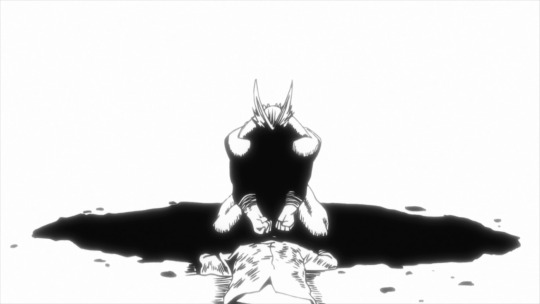
But... as far as I can see, his canon mannerisms don’t seem to contain any of the usual markers that generally signal “look, it’s PTSD!” such as flashbacks, nightmares, hyperarousal, reactions to loud noises, or intrusive thoughts. The strongest anxiety reaction we ever see from him is his reaction to Gran Torino! (Which, by the way, I will always assert was played up by the narrative for funny points.)
This is the case both in specific reactions and in his overall demeanor. To me, he overwhelmingly comes off as comfortable in his own skin and in control of his emotions. Even when he’s describing the most harrowing fight of his life, or the death of his master, he stays composed. When a drone suddenly zooms up behind him and nearly hits him, he does not startle whatsoever... he just calmly snatches it out of the air like a badass.
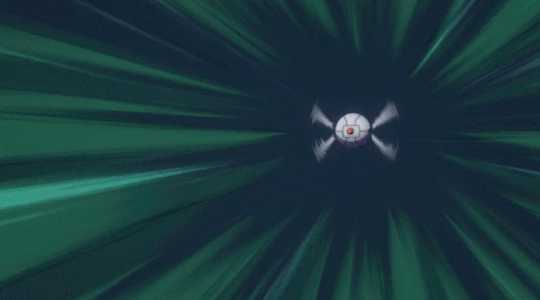
We never see him freeze up under stress. We never see him anxiously overreact or mistake friend for foe. There are several mentions about having nightmares from the terrible fight with All For One that put a hole in him... but AFO is the one complaining about having nightmares, not Toshinori!
I did find this amusing set of panels, but I have a feeling anyone would react this way to having a door suddenly slammed open behind them in the middle of a quiet, dramatic conversation.

We could claim, “well, maybe he just has episodes offscreen. Maybe he’s getting treatment offscreen.” Sure, but we could also claim that maybe he likes to wear fursuits offscreen too. That kind of unfounded speculation is the definition of fanon.
Speaking of speculation, here’s mine: I think it’s perfectly plausible that he’s dealt with PTSD symptoms in the past. But I also think that, considering his immense duties as a hero, he would do everything in his power to immediately seek professional help and treat his symptoms. His Quirk can level city blocks with the flick of a finger. It would only take one wrong move during a night terror, flashback, or accidental overreaction to cause a national tragedy. I cannot imagine he would just sit around and go “welp, I don’t want to see a therapist because Secrets, guess I’m just traumatized forever.” For all his flaws, I think he’s more responsible and caring than that, plus he is a perfectionist and hates anything that interferes with his hero duties. He has an enormous budget, plus the support and coverup abilities of the national government on his side... he could find a way.
All in all... I just don’t see much canonical evidence that he has a condition like PTSD during the events of the show. I don’t see symptoms or treatments. If you think I missed something, please let me know.
Does he have depression?
Okay, welcome to the other 90% of this post.
When we first see Toshinori’s true form, the whiplash is overwhelming. He goes from a blustering, grinning showoff to someone who looks morose, tired, and resigned. Then he says these lines:
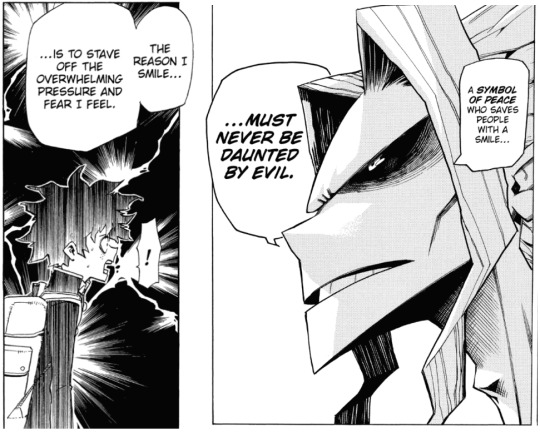
...Whoa. He doesn’t smile genuinely, he only does it as a ruse. His confident front is just a facade, hiding overwhelming pressure and fear. But he must act strong, because it’s his duty. Even if he’s crumbling inside, he can’t reveal his true emotions. It must be symbolic: his emotional “true form” must be just as exhausted and withered as his physical one. What a fascinating, relatable way to represent how depression quietly wears a person down, until they’re emotionally hanging on by a thread and can only spend a few hours a day performing normalcy until they have to sneak off and revert to their burned-out true form.

Look at him wildly overacting to put on a strong front for the kid that he wants to inspire. Such sacrifi-

Um. Anyway, one of these days, the facade will fall, and we’ll get to see the true depths of the bleak, overwhelming depression that he feels such a need to bravely hide...

Hm. This is perplexing.
Now, even severely depressed people don’t just cry nonstop. They can drag themselves out of bed and stumble through the numb haze to do what has to be done. They can fake enthusiasm. They can also legitimately feel inspired by things, or laugh at jokes, or get wrapped up in a fun activity for a time. There are periods of normalcy, scattered in between the long swaths of gray.
So when we ask whether or not a character has depression, we shouldn’t be asking, “why can they smile and function,” but where are their swaths of gray? Where, in the series, do we see them experience bone-crushing fatigue, suffocating sadness and guilt, fixation on past failures, numbness and loss of pleasure in the things they once loved? Depression is a serious mood disorder which impacts how a person thinks, feels, and behaves. Yes, Toshinori has to intentionally fix a smile on his face when performing a hero persona that smiles nonstop. Does this mean he has a mental illness?
I’m going to go through a handful of behaviors and attitudes common to depression, and compare them to what we see from him. We can’t know a person’s inner thoughts 24/7, but something as serious as mental illness tends to leave signs.
(Note that I’m going to address the war arc in a separate section, after all this.)
Behaviors: Lack of energy/motivation
One of the most debilitating parts of depression is that it saps a person’s energy and motivation. It feels like constantly wading knee-deep through mud. Even mundane tasks become difficult and draining.
Behaviorally, this can manifest in all sorts of ways, but people often begin cutting back to the bare minimum essential tasks. It’s difficult to do even the necessities, much less any “extras.” They may stop engaging in leisure activities or hanging out with friends. They can begin missing deadlines or falling behind on work.
In Vigilantes chapter 6+ beta, set several years before the series, we do see an example of Toshinori falling behind on work:
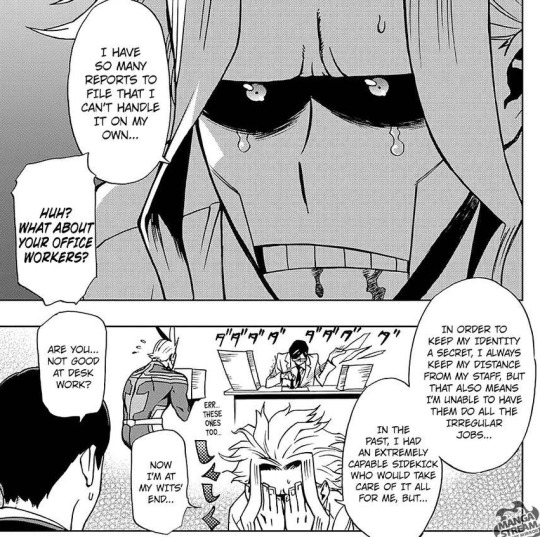
But I would seriously question this as an example of depression-fueled fatigue. Immediately prior to this, we watched him catch a purse-snatcher, stop a hit-and-run, defeat a rampaging robot, prop up a falling bridge, and save a kitten from a tree, all within minutes of each other. The implication just seems to be that he is a workaholic maniac who would generate too many reports for himself no matter what.
Aside from this... I think there’s very little evidence that he lacks energy. At the start of the main series, Toshinori can only physically do hero work for 3 hours a day. And, to our knowledge, he always does so. (Even on his days off... which is what triggers the events of the show!) If you’re using Vigilantes canon, he is also working as his own secretary at the same time. Then he takes on Izuku’s training on top of this. Through the short training montage, we always see him with Izuku at the beach, even when he has nothing to do but cheer &/or heckle from the sidelines. We do see him briefly riding on a Segway, which could have indicated a need to conserve his energy if not for the fact that he dismounts after about five seconds in order to unnecessarily transform into his hero form and shake his successor around like a rag doll.

Then, he also starts working at U.A., a task which requires him to learn huge amounts of new information and integrate into a whole new environment. How does he cope? In the light novels, he goes out for drinks with the U.A. teachers to socialize. He repeatedly jumps to contribute more than necessary, such as when he pesters Aizawa to alter a rescue exercise so he can appear as a villain. In another rescue exercise (depicted in the light novels), he even appears as a villain in his true form—trying to contribute even when he doesn’t have All Might time. (He really seems to like playing villains...) The one time he misses class (USJ) it’s because he spent too much time doing hero work, and he still goes to the effort to show up at the end even though he only has 10 minutes of hero form time left.
Aside from the purely physical limitations caused by his injury, Toshinori has never indicated that he feels drained by his ridiculously demanding lifestyle. In fact, the narration emphasizes repeatedly, like here in chapter 15, that his problem is that he refuses to cut back. And it’s not “you work too hard for an old person with an awful injury.” It’s “you work too hard compared to any human being, holy shit, calm down.” He is always pushing himself to his limits.
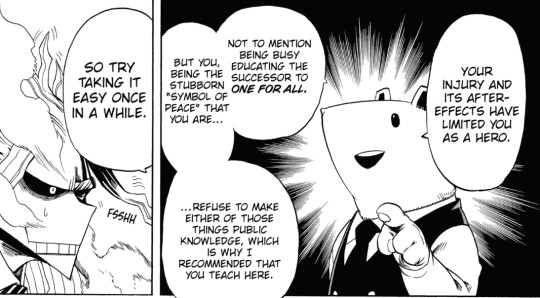
What about motivation? He clearly has enough motivation to get all of his work done, as we’ve seen. But one of the chief reasons that Toshinori decided to train Izuku is because Izuku gave him motivation to act. This could be interpreted to mean that, before meeting Izuku, Toshinori had lost the drive to do his work.
But think about the rest of the story. We just discussed how Toshinori pushes himself to his limits. In this case, the action he found motivation to do was to push past his limits and start spitting blood. That’s a dangerous thing to aspire to, and the story tells us so. Throughout the narrative, we explore the harms of this overzealous self-sacrifice, both as it applies to him, and and as it applies to Izuku, who tries to imitate him.
It wasn’t that he was unmotivated to do hero work at all before meeting Izuku—he clearly was, as shown by the fact that he had already used up all his hero form time on his day off. He was just less motivated to go beyond reason in the process.

Toshinori’s problem has never been a lack of passion—it’s been that he has too much of it, and pushes himself way too hard as a result. Far from needing motivation to act, he is constantly told he needs rest. If Toshinori has depression, it is definitely not hampering his ability to get things done.
Behaviors: Isolation
People with depression often stop hanging out with friends, stop going out to events, and generally withdraw. This does not fit at all with the Toshinori we see in the series. Once the show kicks off, he’s more social than he’s ever been, juggling hero work, Izuku’s training, teaching, and socializing with his new coworkers. Even after the events of Kamino, when he would have plenty of justification to spend several days (or weeks) recuperating and processing his loss of One For All in solitude, he leaps out of his hospital bed within a day to make appearances on national television and punch his successor in the face.
What about how he seems to have no family or friends? He mentions in Vigilantes chapter 6+ beta that he has very few friends that he can exchange personal contact info with, presumably because of his high-profile existence. The isolation of being a public figure is definitely real.

But this post points out that, throughout his career, it seems like he deliberately chose to isolate himself, even when he had no need to. He simply seemed to prefer spending his free time saving people from crime rather than dating, networking, or hanging out with buddies on the weekends. Could this have been some kind of defensive trauma response? Maybe, or it could’ve been that he simply got more fulfillment from his work than from making lots of friends or starting a family. Plenty of people (and a lot of high achievers) do not consider social life to be the pinnacle of their existence. This does not mean they are mentally ill.
In any case, he’s certainly not isolating from people during the main series—in fact, we see more named relationships of his (Nana, Gran Torino, David Shield, Nighteye, Tsukauchi) than most other heroes in the show get.
Behaviors: Sleep/appetite/pain/etc
The one time we see Toshinori apparently having trouble sleeping is in episode 101, when Nezu gently calls him out for spending way too much time compiling information on past OFA users. I’d argue that this seems more related to his obsessive research than to the somatic effects of a mood disorder. (Again with the boundless drive to get things done—something not usually seen in depression.)
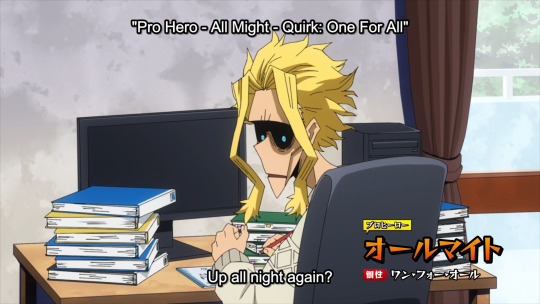
Other than this, we don’t see enough of Toshinori’s day-to-day life to have much insight on whether he suffers from sleep disturbances, appetite changes, unexplained pain, or the other physical symptoms that often accompany depression. Even if we did see these things, they could just be side-effects of his injury.
Speaking of his injury, it’s remarkable how few side-effects we are shown. I think it’s common to go, “Well, I am pretty sure that this injury should have a ton of side-effects and significantly impact his day-to-day life, and we don’t see that. Conclusion: these side-effects are there, but the show just doesn’t want to spend time showing them. In the same way, I think he has depression, but the show just isn’t directly showing it.” Hold that thought; I’ll address it later.
Depression isn’t just characterized by physical issues... it’s a mental disorder, after all. It tends to change a person’s thought patterns and pigeonhole them into predictable mindsets. So, let’s go through a few common ones and see how they compare to the way he acts.
Mindsets: Negativity/catastrophizing
Depression tends to blinker people. Under its influence, it’s very hard to see anything besides the negative sides of a situation. It makes people jump to the conclusion that things will probably go as badly as they possibly can.
This is... the absolute polar opposite of the way we see Toshinori act and think.
Two days into the school year, class 1-A is attacked by villains at the USJ. This event was a horrific disaster for Toshinori. He failed in his teaching duties by using up his muscle form and not arriving on time, and nearly lost his entire class and his coworker because of it. His time limit was massacred: he’s still supposed to be teaching and doing hero work and now he only has an hour per day to do it. Meanwhile, his successor still can’t use One For All without pulverizing his bones to dust.
How does he react?
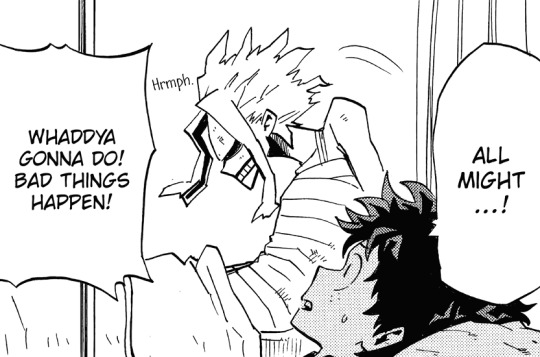
Another example: Kamino. His true form was exposed to the world. His Quirk is finally gone forever, and his hopes for a smooth succession are ruined. Society is sure to destabilize from this, and villains are going to grow bolder than ever in a time when there is now no one strong enough to stand against them. How does he respond?
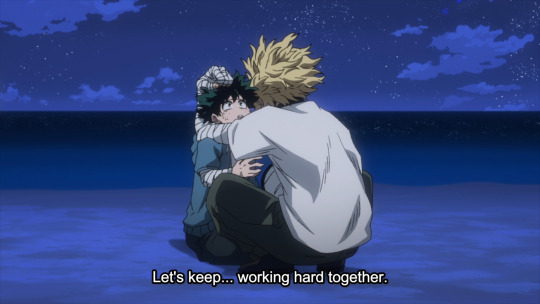
Okay, first he punches Izuku in the face and yells at him. But. He quickly turns it around to a message of praise and hope. He finds something good in Izuku’s constant recklessness: for the first time, Izuku managed to get out of a situation without harm. And he finds something good in the loss of his Quirk: now it means he can devote himself to raising Izuku. Fantastic positive reframing at work.
I could go on, but... just watch the show. It’s obvious. Toshinori’s positivity is one of his most defining character traits. He is constantly bringing up the positive, both to others and to himself. If the odds seem impossible, then just smash past those odds!
Mindsets: Indecisiveness/reluctance to act
In depression, indecisiveness can strike even with tasks as simple as deciding what to wear. People spin their wheels with anxiety and doubt, ruminating endlessly over what they should choose, thinking of all the times they’ve gotten things wrong in the past. Then they avoid making any decision at all out of fear that they might screw up yet again. The bigger the decision, the harder it is to act.
With that in mind, I’m just going to copy-paste some insightful shitposting from @journalxxx about Toshinori’s typical decision-making process:
"This kid I just met two hours ago is perfect, Imma make him my successor, no doubt about it. We're gonna start training tomorrow and I've already picked the perfect spot and also went and planned his whole life for the next ten months, down to the composition of his meals-"
"Yeah, that villain attack on day 2 of school sucked, it brought everyone's moods down... Oh. Oh! But you know what would be cool and instructive? Simulating ANOTHER VILLAIN ATTACK! Oh man, what an idea, hey Aizawa, listen-"
"Oh, my friend's daughter wrote to me to just invite me on a trip after years? Hm, I should maybe think about it for a moment, given the schedules of my new job, my secret health issues, the recent villain attacks- PSYCH, LET ME CALL MY PRIVATE JET PILOT, I'M LEAVING RIGHT NOW- OOOH, AND I'M BRINGING THE KID WITH ME, THIS'LL BE AWESOME-"

(He didn’t even give Izuku time to change out of his school uniform. Why take 30 seconds to change when you could GO GO GO RIGHT NOW?)
Toshinori is the one who introduced the concept that real heroes “move before they think,” and by god, he lives and breathes this motto. Both the Tsukauchi identity reveal and the USJ fiasco happened because he got wrapped up in hero work: when he sees someone in need, he doesn’t hesitate for a second; he immediately hits the ground running. One would assume that, as his time limit got shorter, we would see him agonizing and deliberating about how best to use it... but we don’t.
For the most part, he makes decisions quickly and confidently and then sticks to them. Even with his life’s biggest, ultimate ambition, he apparently ran first and worked out the details later.
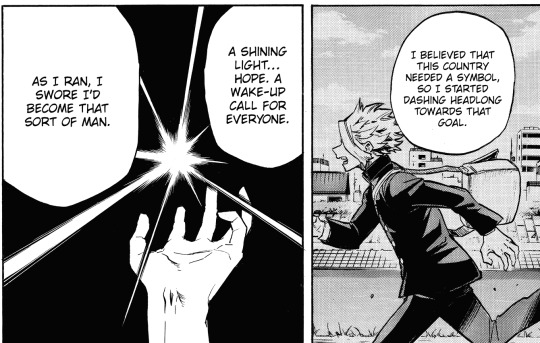
He does have a lot of difficulty initiating personal conversations: it takes him far too long to reveal important backstory info like the origin of OFA, and he had a lot of trouble reconnecting with people like Gran Torino and Nighteye. But this seems like a reluctance to open up, not an inability to choose. He’s always been a secretive person who would rather not talk about himself and who would prefer to conceal facts if it helps create a more positive and uplifting atmosphere. With most other situations, he could honestly benefit from a bit more indecision before impulsively leaping into things.
Mindsets: Lack of pleasure
This one is obviously subjective. We can’t exactly ask him, and the whole premise that kicked off this examination is the idea that he’s faking a smile to hide his fear and pain. But even so, it is really difficult to look at things like the first minute of episode 58 and conclude that he’s not having a genuinely great time.
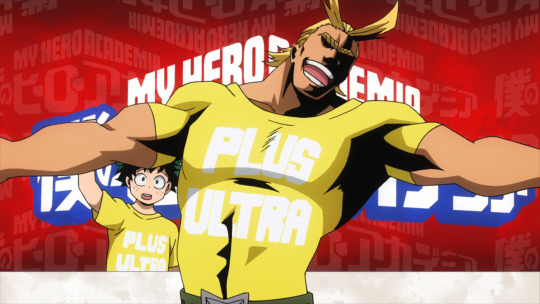
I can’t know for certain, but I am pretty sure that he doesn’t ham it up like this because he’s grudgingly going along with what his media team ordered. I am pretty sure he made a lot of his career and branding choices because he just thought they were really fun and wanted an excuse to burst into rooms while dabbing and shouting corny catchphrases. He doesn’t need to be a huge, ridiculous goof, but he seems to love it, both in hero and in true form.
There’s a frequent idea that the only reason Toshinori works so diligently for so long, and acts so enthusiastic in his hero form, is not because it brings him happiness, but because he’s driven by workaholism. He has to be “on” 24/7 in front of others. If he stopped, or dropped his cheery facade, he would feel crushing guilt for letting down the image he’s supposed to uphold. Therefore: it isn’t that he feels happiness or pleasure from his work like it appears—he doesn’t, he’s desperately depressed and burned-out—he’s just even more desperately trying to avoid shame. There’s no joy in the excessive act he puts on.
There is no question that he’s a workaholic. Multiple characters tell him this to his face. When he talks about why he became a hero, he usually phrases it as feeling driven in some way, rather than “it’s just so nice and enjoyable to save people.” Other people refer to his drive as a “madness.” And throughout the whole story, he struggles with feelings that he’s not doing enough, despite going above and beyond pretty much constantly.
He has stated, several times, that his work is not easy. It’s not all smiles. In fact, it can be crushing, something he mentions in chapter 317.

But does this mean he has gotten no enjoyment from his hero persona? That it was never anything but a horrible slogging trap of obligation and guilt? That seems absurd. It disrespects his compassion and the earnestness of his heroic motives. Are we really supposed to believe that he gets no happiness from reuniting families after a disaster? No warm satisfaction from a job well done, or joy from inspiring people? Not even a smidge of pride from being fawned over? It’s a very hard job, but who’s to say it isn’t worth it?

In the end, we don’t have direct narrative proof either way. He does not look at the camera and tell us, “I feel immense pleasure and fulfillment in my life.” But he also does not say, “I am drowning in sorrow and nothing brings me joy.” To me, it seems most plausible that his drive to work is driven both by enjoyment and aversion... the same as most things in life. People have complex relationships with their jobs and goals. There’s no work in the world that is nonstop fun with no downsides.
Workaholism is definitely a red flag. But it cannot be used to determine someone’s mood or even their opinion of their work. You cannot assert “this person must feel no pleasure from their job” just because it’s hard and they would feel guilty if they quit. The person would need to show several other worrying patterns before this would become a plausible idea. And meanwhile, I think there’s quite a few signs that he experiences genuine happiness on the regular.
Mindsets: Excessive guilt/regret

Toshinori has the tendency to apologize for things that are not his fault. He is the classic overreaching hero, taking the weight of the world on his shoulders. Some examples:
Both after the Stain arc and after Shigaraki ambushes Izuku at the mall, he apologizes that he wasn’t there to protect Izuku.
After the Summer Forest Training incident, he is mortified that he was blissfully taking a bath while his students struggled for their lives.
He apologizes to Aizawa when Katsuki picks a fight with Izuku, saying that he should’ve been more sensitive to Katsuki’s mental state. No, Katsuki’s just feral.
He apologizes that he wasn’t able to be more helpful to Izuku in the Villain Hunt arc. Yeah, because Izuku ditched him!
This seems like a natural consequence of his grand hero goals and the overpowered Quirk he lived with for 40 years. It makes sense that, as his power wanes, he is going to have trouble letting go of his overinflated sense of responsibility. At the same time, he seems aware of this issue and knows that it’s unreasonable, shown when he comments in chapter 22 that he and Izuku are alike in their compulsion to personally apologize for everyone else’s problems.
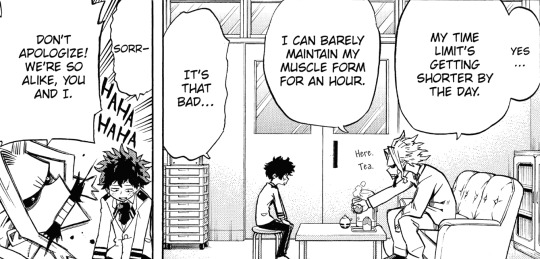
In addition... he is also just a polite Japanese guy, even if he steals Western superhero imagery left and right. In the U.S, this kind of behavior looks dysfunctional, but in Japan, it’s customary to politely apologize all the time for the most unnecessary things. The notes below come from a story draft that Horikoshi, this show’s mangaka, gave to his animation studio. These notes are an example of normal Japanese humility!

(Note that the finished OVA almost exactly followed this so-called "incoherent" script.)
Interestingly, despite this reflexive apologizing, he doesn’t seem to dwell on his failures for long. Excessive guilt and regret is all about rumination. Izuku is a great example of this, as he does it repeatedly, mulling over old topics and beating himself up after the fact.
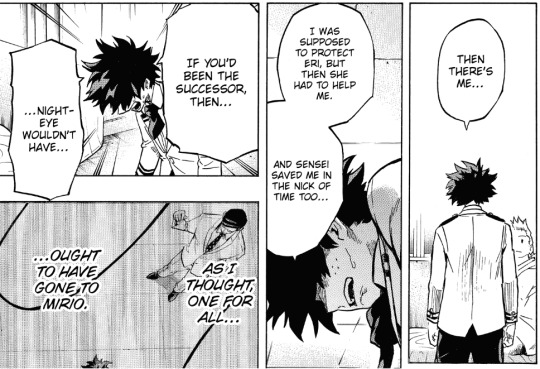
But Toshinori behaves very differently. He is forced to confront and deliver a lot of bad news over this series, but he usually handles it in a remarkably non-judgmental and matter-of-fact way. And then, we almost never see him revisit it in order to berate himself. Examples:
At the USJ, he says “I’m sorry, Aizawa,” when seeing the awful injuries he could have prevented if he had been there... and that is the last we hear about it. We don’t ever see him bring up the incident again to fret about how he should have been there or done better. Instead, he brags about how Class 1-A did a stellar job and how the villains picked the wrong fight. (Positive reframing, again!)
When he learns about All For One being alive again, he’s naturally upset... but we don’t see him berating himself for failing to do the job right the first time. He has a lot to be guilty for: Izuku now has to face the horror he couldn’t defeat. But he doesn’t really get down on himself for it.
When he learns about Shigaraki being Nana’s grandson, he is naturally horrified. He tries, later, to take on the task of saving Shigaraki. But Gran Torino and Tsukauchi immediately shoot down his idea and tell him it’s not his task. He still does what he can to help the war effort, but I don’t recall him revisiting this topic to ruminate over his failure to save his master’s grandchild.
When asking Inko’s permission to let Izuku keep going to U.A., he spends very little time begging forgiveness. He immediately turns it around and asks her to... think on the bright side of things, and imagine the good instead of ruminating on the bad.
Nighteye is one of the few exceptions. When Toshinori speaks with Endeavor shortly after Nighteye’s death, it’s clear that he still feels regret about the way he cut Nighteye off so long ago. Nighteye also haunts his thoughts later... which I’ll get to.
Interestingly, I believe the story strongly suggests that he ruminates and apologizes too little, and that this is a character flaw. For example, in episode 5, after the entrance exam, when Izuku asks him whether he knew One For All was going to shatter all his bones, Toshinori doesn’t berate himself for causing his student horrific pain. Instead, he replies with... a thumbs-up, a big grin, and a lame pun.

In fact, unless I’m forgetting, he has never apologized to Izuku for his harsh speech on the rooftop, for all the bone-breaking, for failing to defeat AFO the first time, for withholding vital information, or for generally doing a terrible job as a mentor. There are many, many fix-it fics out there that are clearly frustrated about this behavior. It has taken him over 300 chapters to begin to self-reflect and realize the folly in this. As of this writing (chapter 360) he still hasn’t gotten around to giving his successor a proper apology that actually addresses his real failings, instead of a generic “sorry I couldn’t save the day.”
So he apologizes for things he shouldn’t, and doesn’t apologize for things that he should. Flawed? Yes. But overall pretty low on the guilt and regret.
The tally so far
Lack of energy/motivation: none we can see. He is on the go constantly.
Isolation: none we can see. He seems to prefer work over idle socializing, but it would be hard to expect much else from the #1 hero.
Other physical symptoms: none we can see.
Negativity/catastrophizing: pretty much none, impressive considering this series is a giant string of disasters. He is practical with bad news and practices positive reframing all the time.
Indecisiveness/reluctance to act: he is extremely decisive, almost too much so.
Lack of pleasure: subjective, but he seems to have plenty of genuine fun.
Guilt/regrets: apologizes for stuff he shouldn’t, but does not dwell on things. In fact, his refusal to self-reflect on his mistakes could be considered a flaw.
This is why I bothered to make this post at all. The depression take has always fascinated me because from what I can see, it’s not just that it’s debatable: it’s that most of his behaviors seem like the polar opposite of what you’d normally see in a person suffering from depression.
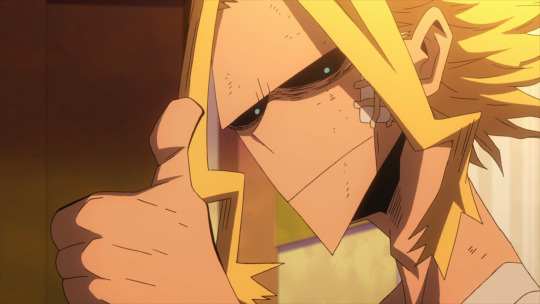
I am not trying to say that he is perfectly well-adjusted and has absolutely no problems. He is a clear workaholic and has dangerously skewed opinions about his limits and his sense of responsibility. He is extremely reluctant to open up about personal topics and tends to hold people at a distance. He does not self-reflect on things he should—this could be a sign that he dissociates from his flaws instead of facing them. All I’m saying is that these problems do not seem to involve depression as it’s normally understood.
But I’ve left out an important scene, one of the most decisive in this entire discussion.
Fighting Fate
This scene, starting in chapter 130, is considered proof positive that Toshinori had pretty much given up on life, at least before he met Izuku. Because Toshinori straight-out admits that, when Nighteye told him that he was going to die, he went right ahead and accepted it.
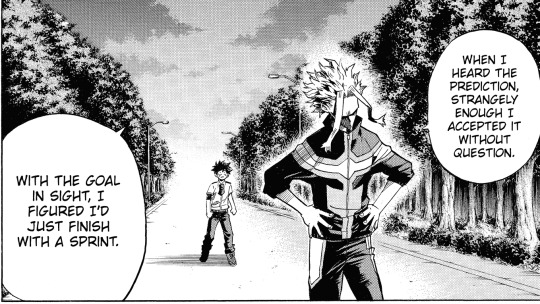
What kind of person would just roll over and accept death? Only someone who’s lost all hope, right?
You may be anticipating a rebuttal. Good instincts.
Think back to the hospital scene where this prophecy happened. Toshinori had just experienced a devastating injury, something he would never truly recover from. Considering his usual invulnerability, it was also, most likely, the first time he’d ever been badly injured in the line of duty. Imagine how terrifying and bleak life must have felt, constantly wondering whether he’d die suddenly and uncontrollably at any instant from the thousands of complications that can come from losing so many vital organs. He decided to use whatever remaining time he had left to uphold his duties as the Symbol of Peace, at least until a successor could be found to take his place.

But then... Nighteye informed him that he was, essentially, guaranteed to survive for an entire six or seven more years. And not only that... he would die while facing off against a villain, which presumably meant he could do hero work during that time. That had to be incredible news for someone who didn’t know whether his remaining life was going to be measured in years, or weeks, or days, or hours. It must have been an enormous relief. And it’s no wonder he skipped right out the hospital doors, if he had been promised he would survive for years to come no matter what. I mean, why wouldn’t you fight as much crime as you could if you had the guarantee that you would never die for at least half a decade?
To me, his behavior perfectly aligns with the attitudes we’ve seen in the previous sections. He knew, better than almost anyone, how infallible Nighteye’s prophecies were. So he didn’t dwell on the unfairness of it or hesitantly spin his wheels while pining for a rosier solution. He just immediately chose to make the best of what he was given. To me, that doesn’t look like depression or hopelessness at all: that looks like a remarkably proactive, pragmatic approach to one’s inevitable mortality. (It also looks like raging workaholism to try and go back to work while still barely able to walk, but nobody’s perfect, and again: I think this driven behavior fits workaholism way better than it fits depression.)
In the real world, if somebody got a terminal diagnosis with a fixed time frame like this, Nighteye’s desperate bargaining (“We’ll change things! Somehow! In some unspecified way!”) would be considered the dysfunctional attitude, while All Might’s resolution to get on with his life would be the well-adjusted, healthy one. His only “flaw” was that he didn’t idealistically assume he could escape the inevitable just by really, really wanting it to happen.
But luckily, Izuku came along to remind him that he lives in a superhero comic. And so, when he reached his finish line... he rose up, sent his optimistic streak into overdrive, and refused to accept his fate.

To me, this fight was astonishing. Because depression is crushing. Depression is exhausting. The urge to lie down and give up is overwhelmingly powerful. Even if you can push past it in order to do your duty, it’s always still there, weighing you down, whispering in the back of your mind.
But we got to listen to the thoughts inside his head during this fight, and we didn’t hear those whispers, not for a moment. He never wistfully said goodbye to the relief of that finish line, or mused that it would have been nice for his pain to finally be over. He never complained that his responsibilities were too heavy. He didn’t push back those negative thoughts—because they weren’t even there in the first place. Instead, his mind was filled with thoughts of his loved ones and the duty that gives him purpose. He ignored AFO’s taunts, pushed aside the awful shock of learning about Tenko, and chose to defeat his destiny.
How My Hero Academia handles hidden emotions
(Spoilers ahead for anime-only watchers)
You may be saying at this point, “This nitpicking is pointless. We heard him say that he smiles to cover up the pain. So of course we wouldn’t see symptoms. Clearly, he’s just stoically hiding his suffering. He has no energy, but he makes himself get up in the morning. He consciously pushes aside the dark thoughts and chooses to be uplifting. He doesn’t complain because he needs to set a good example.”
You may also be saying, “This is unfair. You’ve barely said a word about the Aizawa bench scene or the Stain confrontation in any of your examples.” That’s right! I’m going to get to those now.
One thing I learned pretty quickly is that this show is not coy about telling us when a character is having trouble, even if they are trying to hide it. When Ida was trying to “show a strong face” during the Stain arc, his attempts to hide his distress in chapters 45 and 46 were about as subtle to the audience as a sack of bricks.

We see this same pattern in many other characters. Here is an example from Izuku in chapter 163, putting on a brave face and claiming he’s fine. Note how the narration beats us over the head with the fact that he is not, in fact, fine.

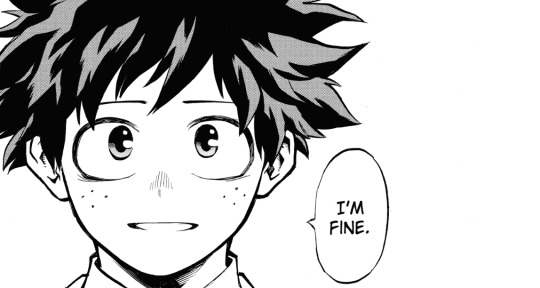
Endeavor and Hawks also come to mind as characters who put on a stoic face towards others. And yet, we are given inner thoughts and private moments where we see their true feelings. I’m pretty sure Bakugo is the one who’s been consistently the most mysterious about his true feelings, which is saying something. This show is not subtle overall.
Initially, when we didn’t see this happening with Toshinori, I thought that he was just being Plus Ultra once again. His whole arc is about hiding the truth of himself, right? So of course he’d hide his exhaustion and pain from the successor he’s trying to inspire. He doesn’t want to inconvenience others, or draw attention to his own problems. He must be so good at deflecting concern that he can even hide it from the narration!
But then, the series continued, and... suddenly, we started getting the same blatant signs that we got from every other character. We were shown, very plainly, that he was struggling with feelings of being unable to help like he once could. As soon as Aizawa asked him what was wrong in episode 113, he plainly stated, “I am struggling with feelings of being unable to help people like I once could.”

What? He just casually blurts out his troubles to a coworker the second they question him? What happened to “put on a smile at all costs”? What happened to stoically hiding his sadness no matter what, to the point that there’s no evidence he’s sad at all?
As the stability of the nation crumbles and things get worse and worse and worse, he gets less and less subtle. He starts dwelling on his past failures, thinking about Nighteye over and over, and berating himself for his shortcomings. He tries his best to keep his turmoil hidden, and for the most part, it’s kept private from other characters. But we see it clear as day. We are clearly shown tons of blaring depression warning signs: feelings of worthlessness, lack of motivation, rumination, guilt, indecisiveness, hopelessness.

At the climax of it all in chapter 326, he goes wandering off dramatically in the rain (subtle!!) and freely discusses his negative thoughts during a truly wild serial killer therapy session.
We, the audience, are very clearly shown every step of his pain. And after he’s processed through it for a while, he leaps with both feet back into proactive, positive action, doggedly contributing to the war effort, the same energetic behavior he shows during the entire rest of the show. He’s definitely shaken, and may very well still be dealing with persistent negative thoughts (“crawling through the mud,”) but his spirit is not broken, and he’s pushing forward as best he can.
Will he backslide after this? Who knows; the manga isn’t done yet as of this writing. But it sure looks like a typical character crisis/resolution arc. He went through a harrowing time of self-doubt, and by chapter 327, came back out of it with renewed determination to help and faith in his students and in the future.

So what gives? This certainly looks more like a classic depressive episode than anything we’ve seen thus far. All in all, it comes off remarkably similar to the way that pretty much every other character’s emotional troubles are handled: blatantly. And he picks himself back up really fast.
Some might say that he was always secretly depressed, and only opened up to Aizawa because the stress was just too much and he broke down. But I argue, again—My Hero Academia tells us when its characters are experiencing emotions, even if they conceal them from the rest of the cast. It makes no sense for Toshinori to be an exception.
For the first 250 chapters of the show, Toshinori does not show any signs of lethargy, excessive rumination, negativity, feelings of worthlessness, or other signs that typically accompany depression. We get plenty of glimpses into his private, inner thoughts during this time. We even get to watch him hiding his emotions! And, like almost every other instance of characters hiding their emotions (this example in chapter 59), his true feelings are crystal-clear to the audience. (He’s also not very subtle in general. Not really a master at concealing his distress.)
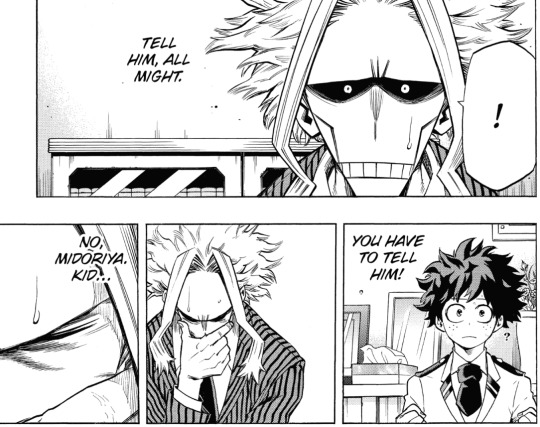
Then, we get a character arc where he does display all those depression warning flags, very clearly and straightforwardly, in much the same way that the show portrays other characters trying to deal with mental distress. So what does that mean for the beginning of the show, when we never saw anything like that?
The clearest explanation of all this, to me... is that Toshinori has never been playing 5-D chess with the narrative. What we saw is what he felt. We can now tell that he was never cleverly trying to bluster through depressive attitudes back then, because we now know what it actually looks like when he’s trying to bluster through depressive attitudes. His remarkable ability to act like someone who does not have a mood disorder makes much more sense if he does not, in fact, have a mood disorder.
Except for one thing... the rooftop scene that started all of this.
What was going on there? If he never had depression, why did the show start off with such a wild red herring? Why have him announce that he was hiding horrible, crushing anguish, then turn around and make him act perfectly normal for the vast majority of the show?
Heading back to the rooftop
This gets into very speculative territory. But please hear it out, and decide if it makes more sense than secret-depression-with-no-symptoms. To me, the key is to look at the whole rooftop scene in context.
Let’s think about it from Toshinori’s point of view. He’s just been accosted by, from what he can tell, a rabid fanboy with no sense of boundaries. He has no idea how important Izuku’s dream is, and Izuku doesn’t exactly sell his ambition very well.

Izuku is a skinny, timid little string bean who clearly hasn’t trained for a day in his life. He describes saving people as... “cool.” And now he’s blithely asking if it’s possible to become a hero on All Might’s level without a Quirk. To Toshinori, Izuku probably looks like just another head-in-the-clouds, delusional fanboy. (There’s plenty of room to argue that this was exactly Izuku’s mindset until Toshinori dropped opportunity into his lap. He did not seem to actually try very hard, he just had a lot of vague dreams and a notebook blog. But that’s for another discussion.)
Toshinori probably encounters dozens of kids who act just like Izuku every day: kids with no sense of perspective, who look at heroes and thoughtlessly go “that looks cool, I wanna do that.” After all, earlier in the chapter, every single kid in Izuku’s class seemed to be planning a hero career, including the kids with amazing powers such as “has a long neck” and “has puffy cheeks.” Good luck with that, kids.
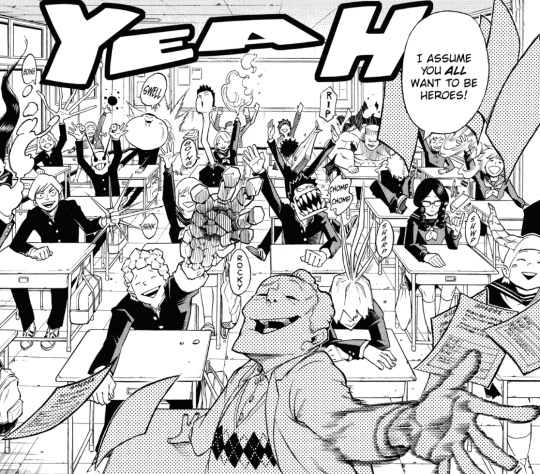
I wouldn’t be surprised if All Might’s example specifically causes problems with expectations: he makes everything look fun and effortless, easily saving everyone with a smile, so young fans make unrealistic assumptions about what hero work is actually like. Long-neck kid is going to get a horribly rude awakening when he realizes how traumatic the profession can be and how unsuited his Quirk is for the job. It’s got to hurt Toshinori, knowing that he’s inadvertently setting up innocent children for this kind of shock and disillusionment. And now, he’s seeing those unrealistic assumptions play out in this youngster, who’s already reckless enough to do dangerous things like grab his leg when he’s about to launch into the air with the speed of a jet plane.
It’s probably hard to talk kids out of this idealistic mindset. But because Izuku has seen his true form, Toshinori suddenly has a lot of options available that he usually doesn’t. The cat is already out of the bag, so now he can use the reality of his situation to give this kid the biggest wake-up call possible. Hence showing him the scar. Hence talking about his smile.
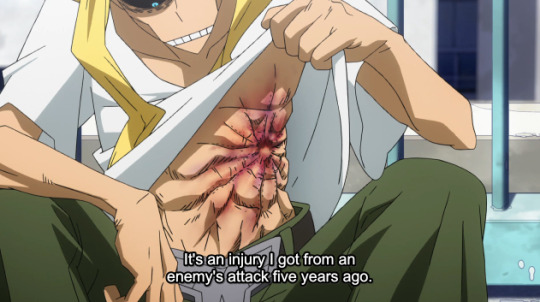
My takeaway is: when he talked about his smile hiding his fear, I now don’t think Toshinori was trying to make some kind of deep personal admission about how he has to conceal his true feelings. It wasn’t really about his feelings at all. It was simply about trying to convey a sense of reality to Izuku. “Look, I don’t smile because this job is effortless, even though I make it look easy. In reality, hero work is difficult and frightening. Please understand the gravity of what you’re trying to get into. Even I haven’t come out unscathed.”
He’s been through hell. His job is much harder than it looks. But I don’t think he’s trying to tell a child he just met that he’s secretly depressed and living a double life. Despite the struggles he’s been through, his positivity, drive, and hope are genuine, and we see that clearly throughout the entire rest of the show. He just doesn’t want this poor kid to get the wrong idea about hero work.
I hope all this was able to demonstrate why, nowadays, I don’t think he was suffering chronic depression during this series. Now, before the series? We can’t know. I’m sure that he was devastated after Nana’s death, and had a nightmarish time trying to adjust to the reality of his injury. But over a long period of time? I seriously question whether he would have been able to accomplish the superhuman career that he did while juggling a chronic mood disorder—to me, it belittles the debilitating nature of this condition to claim, “well, he pushed past all the hampering symptoms just by being so driven and noble.”
We saw him go through a crisis in the war arc, and he is likely still dealing with that internally. To me, the fact that he picked himself back up so fast just makes it even more unlikely that he has been quietly buckling under a long-term mood disorder this whole time. I don’t think he was hiding crushing, overwhelming negative feelings and putting on a brave face, because this series shows us whenever characters—including him—do things like that. He’s had a hard life, and he has plenty of problems, but I don’t think that this mood disorder has been one of them.
But why doesn’t he have depression!?
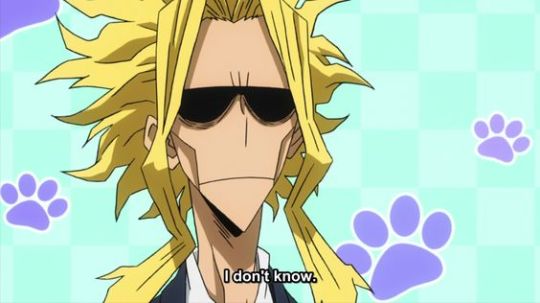
More than the rooftop, more than anything else, I think one of the biggest reasons people headcanon Toshinori as having depression &/or PTSD is simply because they take one look at his laundry list of tragedies and go: “there’s no way in hell a person wouldn’t be messed up after all that.”
And... yeah. That’s a very reasonable point.
In fact, I’d take it even farther: every single person in this show should probably be more traumatized than they actually are. Class 1-A? They should all be on a first-name basis with their therapists by now, with everything they’ve been through. And yet, canonically, they don’t show significant signs of trauma. They process their hardships and then go on to do things like their schoolwork and coordinated dance routines.

This is where we have to accept that this is a shonen series. The poor author is caught between a rock and a hard place. On the one hand, it’s implausible and lazy to just ignore the entire topic of mental trauma, especially with a cast full of children who are experiencing violent crimes firsthand. But realistically depicted mental illness requires huge amounts of time and care to properly address, and characters with mental illness tend to have trouble doing protagonist-y things, like running off to save the world. If the story were to give the cast “realistic” levels of trauma, then the plot would instantly grind to a halt, dragged down by the severe psychiatric problems of 20 teenagers.
What’s interesting is that the series doesn’t just pretend the issue doesn’t exist. During the rescue OVA that takes place directly after the horrific events of USJ, Aizawa tells Toshinori that he shouldn’t throw a random villain surprise into their training exercise because it might be traumatizing.
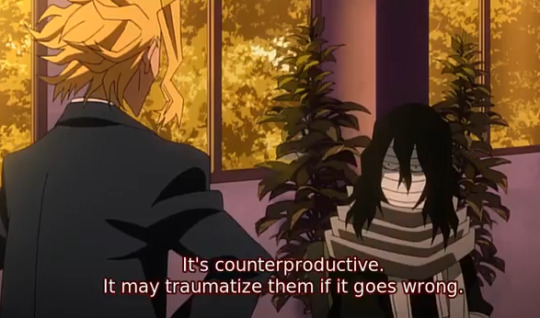
(But then they go ahead and do it anyway.)
Later, after the villain attack of the Forest Training Camp Arc, Nezu specifically says in chapter 86 that the kids received psychological evaluations.

So the show clearly indicates it’s aware of the risks... it just decides that the main characters miraculously happen to be super-resilient. Which seems implausible, and gets more and more implausible the longer the series lasts... but it’s not impossible. There are lots of factors that can have a protective effect against mental trauma, such as being a protagonist in a shonen series.
Honestly, I’d rather have this over-optimistic approach than have the story try to be “realistic.” Because, let’s be real, kids’ action-adventure shows usually can’t handle these issues tactfully. Just look at what happened when they tried to depict super-duper serious trauma with Eri. This poor girl had been tortured and abused for so long that she couldn’t even smile... but in episode 86, shoving her into a noisy, overwhelming concert magically rekindled her joy instead of, say, causing her to massacre half the student body in a panic attack. That’s just how these sorts of stories go... this show does not have the time or space to have her spend a decade in therapy like she probably needs in order to handle an event like this.
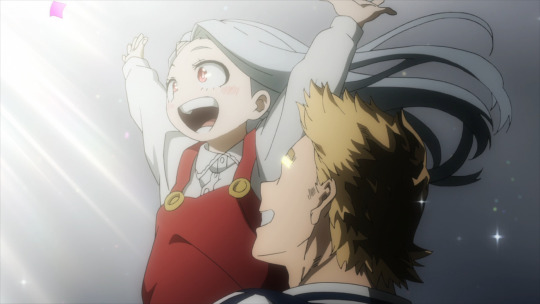
(But gosh, look how cute it is.)
Same thing with Toshinori. Should he have more medical symptoms than we see? Probably, but it would drag down the story. And if the show actually gave him chronic PTSD, then Japan would have likely become a smoking crater a long time ago. In my opinion, the only way he could canonically have PTSD and still keep the story moving is if he just so happened to have a conveniently neutered version of the disorder that never caused any meaningful trouble... and that’s pretty disrespectful to a serious real-life illness. I can get why the author might have looked at this dilemma and decided to avoid giving him PTSD at all. Not out of ignorance, but out of respect and a desire not to misrepresent the condition.
This is exactly why fanworks are so useful: because they aren’t constrained by the many limitations of the main story. They can look at what it might be like if Eri actually needed a decade in therapy. They can see what might happen if Toshinori completely fell apart, or accidentally hurt someone in a moment of panic.
However... please think about the kind of message it sends to say, “Well, obviously, he should have depression/PTSD. He would definitely have them if this weren’t a shonen series. I’m doing honor to his true character to give him these conditions.” Losing a loved one does not automatically doom a person to trauma disorders or mood disorders that persist 40 years after the event. Injuries, even terrible ones, do not automatically doom a person to trauma disorders or mood disorders either. It is horribly bleak to make these claims like they’re givens.
It is also so, so saddening to see so many assumptions that his career as the Symbol of Peace came at the cost of his happiness, or that he lacked purpose or meaning in his life before meeting Izuku. It feels like such a disservice to his heroic spirit and his desire to make a difference in the world. It must have felt so good, so incredibly fulfilling, to be able to help so many people and raise so many spirits, even for a few hours a day. Who wouldn’t feel satisfaction from being able to play such an amazing role? Notice how we only started to see the negative thoughts really creep in once he lost his hero form for good.
He doesn’t need to have suffered through his whole career for his relationship with Izuku to be life-changing. In fact, I think it is much more meaningful if he felt true happiness from his career before starting to teach. Imagine the pain of losing something so important, so joyful, so immensely fulfilling, your life’s work. It would take something equally special and meaningful to fill that deep void and pull him out of the despair we saw in the war arc.

I wasn’t born yesterday; I know that fanfic exists to let us gleefully torture our favorite characters as much as we feel like. Sometimes, at the end of the day, you just gotta give them a debilitating mental disorder. But I question the constant message that optimism and good deeds are worth more if they’re forced out past a pall of suffering. Sometimes, it’s nice to be reminded that people can go through hell and still come out smiling... a genuine smile, not hiding a thing.
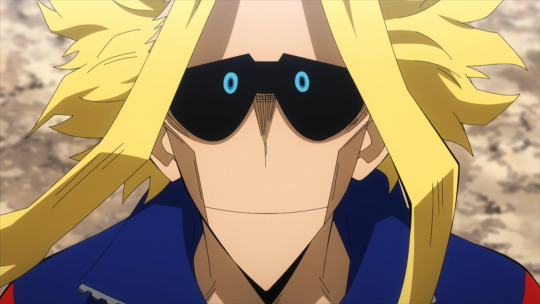
(Thanks to @journalxxx for lots of help and input on this post)
196 notes
·
View notes